
|
#957 (4/9/24)

|
|
BY TONY FOURNIER |
SYDNEY NATHAN — KING RECORDS
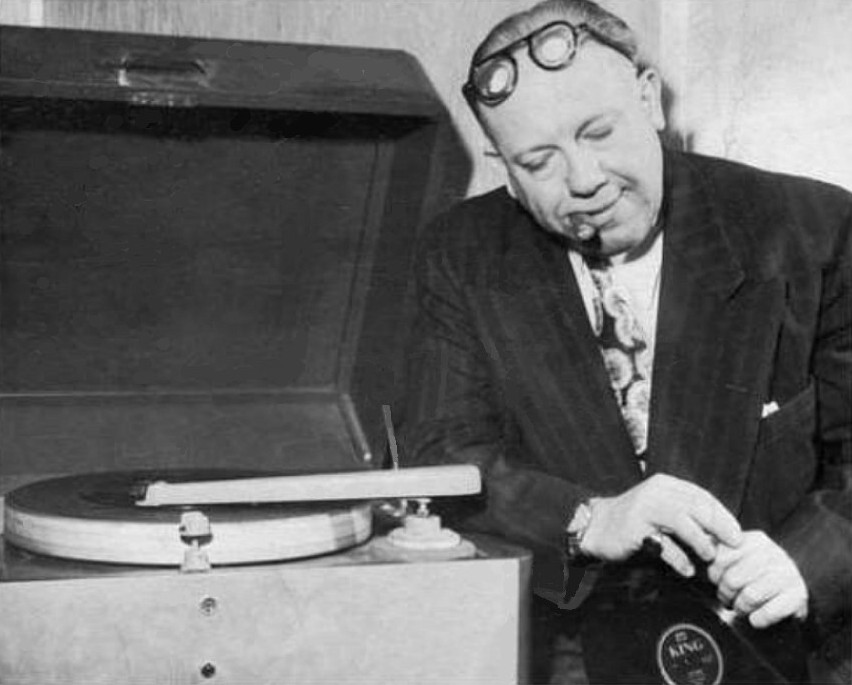
|
Above: Circa 1948 photo of Sydney Nathan, owner and president of King Records.
He seems quite satisfied with the record now playing on the phonograph.
Be careful, Syd, you shouldn't hold a record with your fingers on the grooves.
And cigar ashes are not any better!
CINCINNATI ENQUIRER, February 6, 1949:
JUKE–BOX OPERATOR'S $6 DEBT MAKES HILLBILLY HITS (PART ONE)
BY JACK RAMEYBecause a juke box operator once owed Sydney Nathan $6, Nathan today is President of King Records, Inc., selling 20,000 hillbilly, sepia, spiritual, and folk records a day.
And Bull Moose Jackson, the race singer with the most jump and jive in all sales reports, and Cowboy Copas, No. 2 in the nation in swinging hillbilly and Western vocals, are under contract to King Record.
And the joint really is jumping without making popular records–pops to the trade–and the parent organization now counts five big business subsidiaries and there now are 375 employees.
The original and only five stockholders once did the manual labor. And they never owed a bank or other lending agency a dime. In annual sales, King Records Inc. is now sixth among 1,500 record makers in the nation.
It went like this. The juke box operator borrowed $6 from Nathan in 1938, when Nathan operated Syd's Record Shop in the 200 block on West Fifth Street.
"Six bucks meant more to me in 1938 than $1,600 now. One night I saw the fellow at Beverly Hills with a gorgeous babe. I figured he would be in the next day with my six bucks. He didn't show. For three weeks in a row I saw him at Beverly with the same babe.
Finally on the dance floor, I grabbed his shoulder, told him that if he could afford Beverly, he certainly could repay me. He turned red, blue and green, told me he didn't have it.
The next day he came in the shop and offered me 300 hillbilly, western, and race records, old ones from his juke boxes, at 2 cents a platter. He figured that I could sell enough of them for 10 cents each to get back my six bucks. I took him up.
"The first afternoon I made $18. Naturally, I wondered how long this could go on. I bought more old records from juke box operators. Some I sold for a dime, some for 15, 20 and 25 cents. I even found collectors' items worth real money."
It was good business, Syd was in the bucks. But his brother, Dr. David A. Nathan, was starting his practice in Miami, Fla., and Syd wanted to be certain his brother's offices were the best. So he sold the record shop to his brother–in–law, Sol Halper, and went to Miami.
There, in 1939, the year Florida remembers for snow and sleet and a lousy tourist season, Syd almost lost his shirt in a photo–finishing business with retail outlets. With $900 left, he came to Cincinnati, lived in the Hotel Gibson.
One morning he awakened with a total capital of $3. "I decided it was time to go back into business or go to work for somebody. I decided for business."
Syd went to the landlord of a shop at 1351 Central Ave., next to the Cat and Fiddle. The place needed cleaning. Syd said he would take it at $30 a month, and that he would need two weeks to clean it.
The landlord agreed, but when he found Syd didn't have the rent, wanted to know: "What the hell kind of a deal is this?" Syd shot back: "You don't think I'm going to waste two weeks cleaning it if I'm not going to make it go." And the deal stuck.
Nathan got credit from record makers, stocked his place. Got back in the used record business with juke box dealers as his supply.
He bought and sold records by the thousand. Bought as many as 1,500 hillbilly tunes by Roy Acuff at a time. Though Columbia wouldn't have the 1,500 and would have to cut the records.
(TO BE CONTINUED IN THE "KING RECORDS - PART THREE" ARTICLE)
Above: Photo of the King Records Building located at 1540 Brewster Avenue in Cincinnati, Ohio. This is apparently a view from the back. If anyone can date this photo, please let me know. From the look of the vehicles, perhaps in the mid-1960s?
CINCINNATI ENQUIRER, June 3, 1948:
LOCAL COMPANY BUSY: While Columbia Records, Inc., was preparing to close its Kings Mills plant due to a drop in record sales and other factors. Sidney Nathan, President of King Record Co., Cincinnati, said his company was swamped with orders and was preparing to break ground for an addition to its plant on Brewster Ave.Nathan said the expansion would add about 10 per cent more employees. The company, organized three years ago, employs about 500 persons.
The King Co. specializes in "hillbilly" tunes, and at present is ranked fifth among the record producers. Nathan said the company formerly closed its plant last week to give all employees a vacation at the same time, but this year, because of the order backlog, would have to parcel out the vacation periods.
An official of Columbia Records said sales were off about 35 per cent. Approximately 500 persons will be affected by Columbia's move.
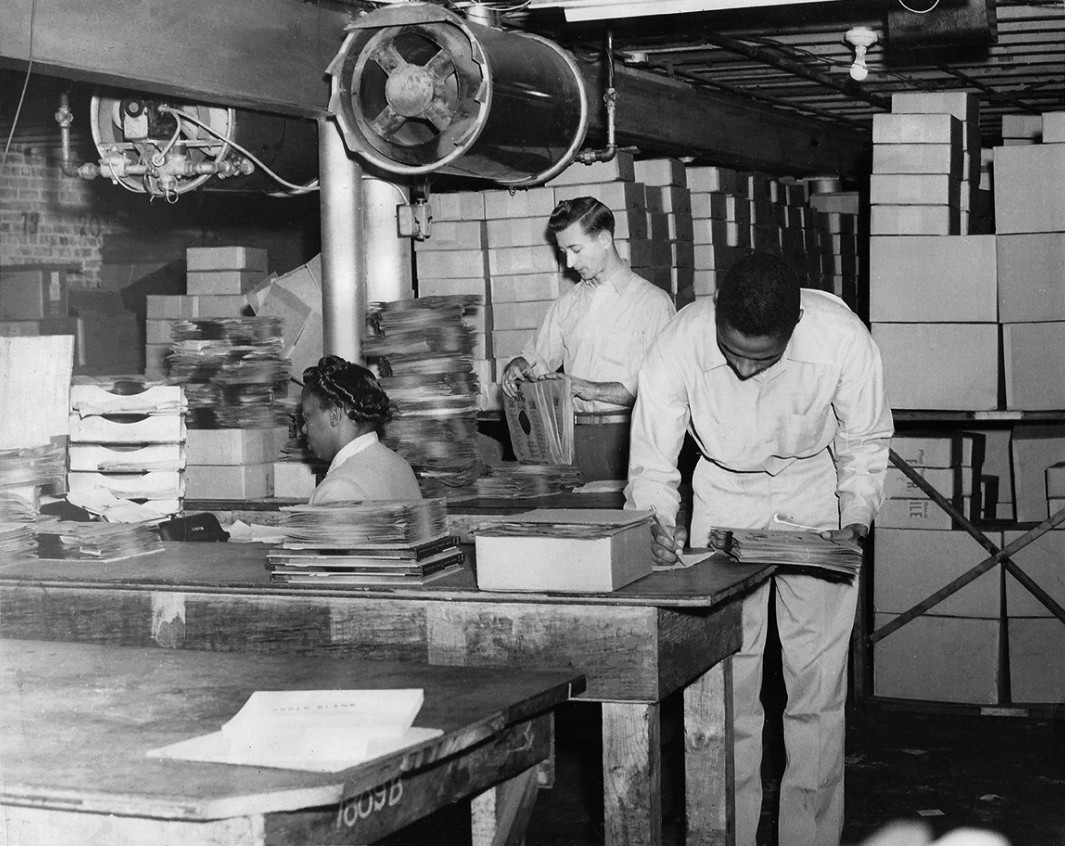
|
Above: Photo of the inside of the King Records Building. Looks to be 78-rpm record albums at the bottom of the stack in the center of the table.
LONNIE JOHNSON Lonnie Johnson was a singer, guitarist, violinist, and songwriter. He joined King Records in 1947 and had a productive stay with them until 1951. Lonnie's first record on King, "Tomorrow Night", released in early 1948, was his biggest hit.
Lonnie had previously recorded that song, released on Detroit's Paradise Records in late 1947. Some other labels he had records with in the 1940s were RCA Victor–Bluebird, Disc (New York City), and Decca.
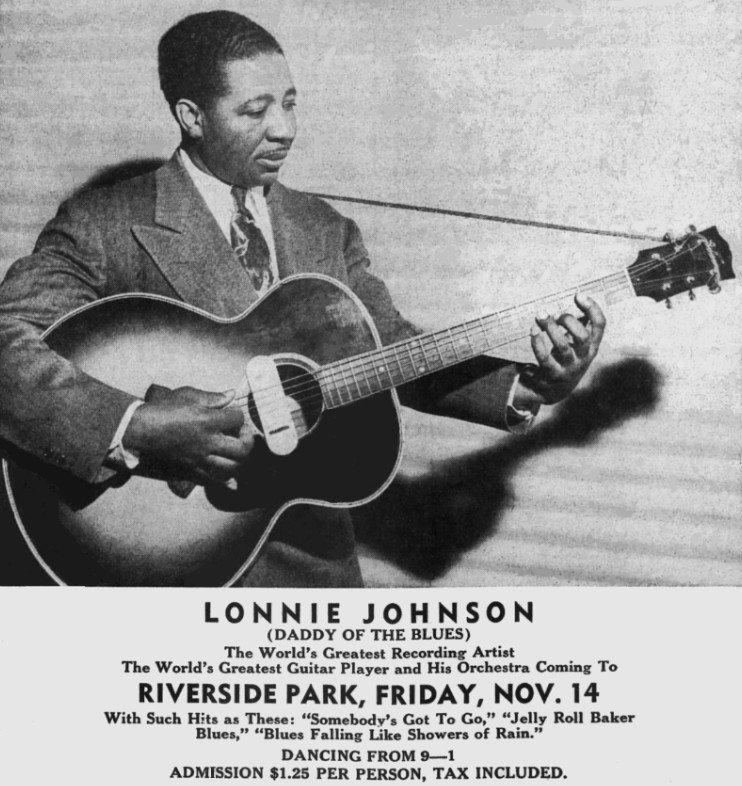
|
Above: ARIZONA SUN, November 7, 1947. "The World's Greatest!"
Above Left: Label image of King 4201-A , released in January 1948. No credit is shown on the label for the composer. Credit on the flip-side, "What A Woman", is given to Lonnie Johnson and is confirmed at BMI.com.. Above Middle: Label image of Paradise 110-A . This seems to be the short-lived original design of the Paradise label. If so, it was released in December 1947, the label's first record. The composer's name, William Grosz, is misspelled on the Paradise labels ("Gross" vs. "Grosz"). The flip-side is an instrumental by George Dawson's Chocolateers.
Above Right: Label image of Paradise 110-A . This was the standard label design for Paradise Records. Don't understand changing from an attractive label design to a bland one, unless it was the other way around. The Paradise audio selection below is from the above middle record. The dead wax for both labels have "110-A" and nothing more.
At Direct Right: CASH BOX, January 17, 1948.
Paradise Records, at this time, was located in Detroit. Mrs. Delmar Ray was the proprietor. Its subsidiary was Delray Records. The "PMC" on the label stands for "Paradise Music Company". It was later changed to "RMC", "Ray Music Company", owned by her husband, Reuben Ray. Note that the middle label image shows "Paradise Recording Company".
Billboard, December 27, 1947:
NEW DELRAY DISKERY WILL BUCK AFM BAN WITH BACKLOG
DETROIT, Dec. 20—A new record firm venture by William Ryan and Mrs. Delmar Ray—Delray Recording Company—is going ahead here undaunted by the coming Petrillo ban.Mrs. Ray, wife of Reuben Ray, one of Detroit's leading juke box operators, says she has a backlog of some 150 masters by Negro talent (hitherto unwaxed) accumulated over the past five years and will use these as beat-the-ban fodder under two new labels, Delray and Paradise.
The firm, however, will cut six more sessions before the December 31 deadline. The first releases by Delray under its Paradise label include Tomorrow Night by Lonnie Johnson and I'm So Right Tonight by Evelyn Collins and the Chocolateers.
LISTEN (Windows Media Player):
1. "Tomorrow Night" - Lonnie Johnson - King 4201-A - 1948.
2. "What A Woman" - Lonnie Johnson - King 4201-B - 1948.
3. "Tomorrow Night" - Lonnie Johnson - Paradise 110-A - 1947.ALL THREE SONGS played in sequence.
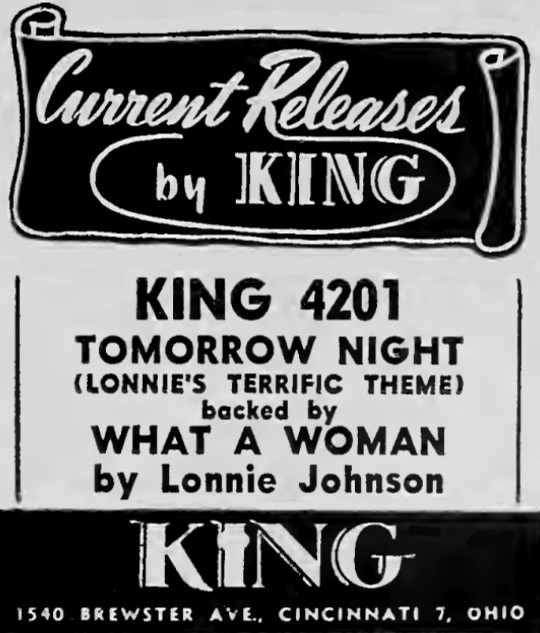
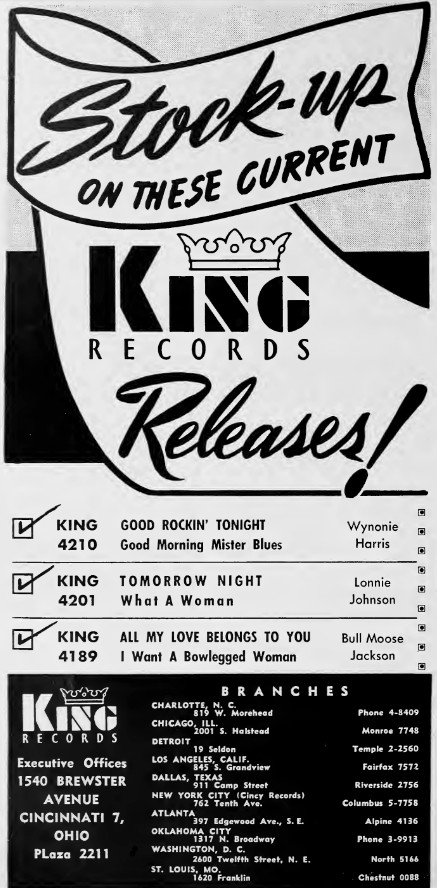
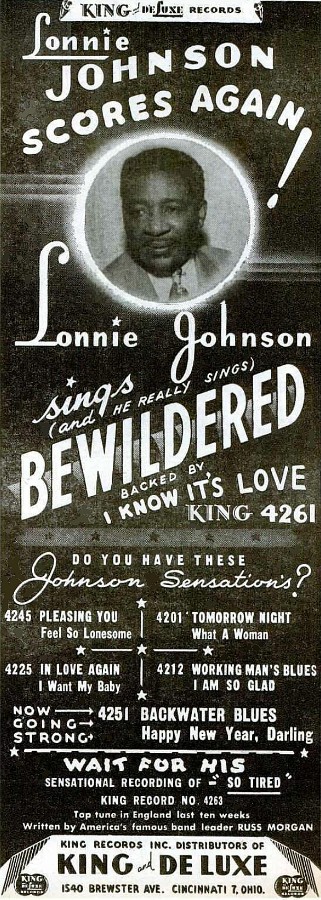
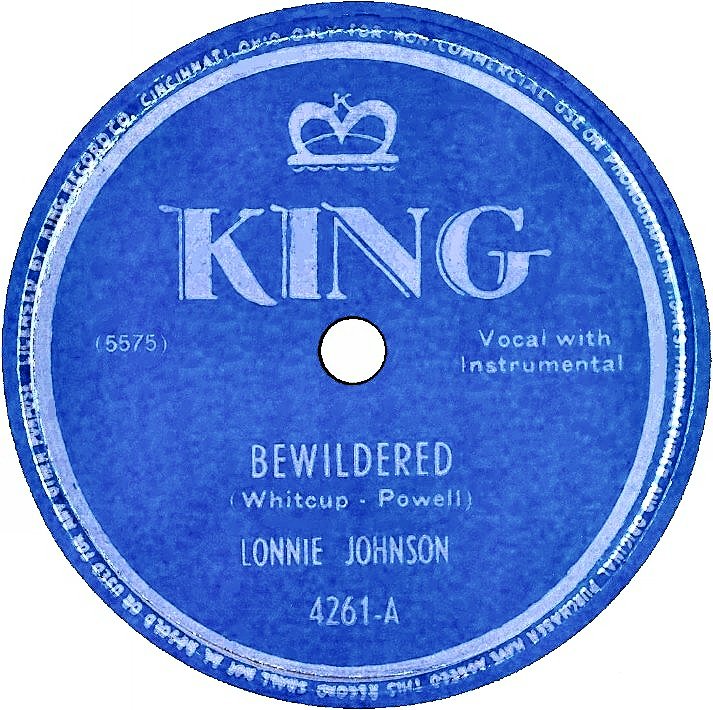
Above: Label image of King 4261-A, released in January 1948. The song "Bewildered" was composed by Teddy Powell and Leonard Whitcup in 1936. The flip-side, "I Know It's Love", was written by Lonnie Johnson."Bewildered" was heavily recorded in 1948-1949. In addition to Lonnie Johnson, there were versions by The Vocalaiers (Sensation), Amos Milburn (Aladdin), Joe Medlin And The Three Riffs (Atlantic), Billy Eckstine With The Quartones (M-G-M), The Ink Spots (Decca), The James Quintet (Coral), Hadda Brooks With The Ebonaires (Modern), and others.
LISTEN (Windows Media Player):
1. "Bewildered" - Lonnie Johnson - King 4261-A - 1948.
2. "I Know It's Love " - Lonnie Johnson - King 4261-B - 1948.BOTH SONGS played in sequence.
Above Left: CASH BOX, May 1, 1948. Above Right: CASH BOX, December 4, 1948.
NOTE: King distributed DeLuxe Records, but didn't acquire them until 1951.
EXTRA RECORD — TOMORROW NIGHT The 1939 song, "Tomorrow Night", was composed by Sam Coslow and Will Grosz (aka Dr. Wilhelm Grosz). The Horace Heidt, Ben Bernie, Ozzie Nelson, Henry Russell, and Jimmy Dorsey orchestras all did the song in 1939, with Heidt having the hit version. Elvis Presley recorded the song for Sun Records in 1954, but it was kept in the can.
Coslow also co-wrote "Romance In The Dark" (Lil Green, The Diamonds, The 4 Blackmoors, Hadda Brooks, and Sarah McLawler). Grosz also co-wrote "Red Sails In The Sunset" (The Five Keys, The Balladeers).
Lonnie Johnson had a big hit with the song in 1948, his first record on the King label, reaching number one on the rhythm and blues charts for several weeks. In my opinion, though, the best r&b version was done by LaVern Baker And The Gliders on Atlantic in 1954.
Above Left: Photo of LaVern Baker. LaVern had six records released on Atlantic with "The Gliders" vocally backing her (1954-1956). Her first record on Atlantic was the excellent "Soul On Fire", issued in 1953. Above Middle: Label image of Atlantic 1047, released in November 1954. The label incorrectly attributes the composer as Lonnie Johnson. Notice that Johnson's King label, further above, does not credit any composer. This is the flip-side of LaVern's big hit, "Tweedle Dee".
Above Right: ATLANTIC CLIPPING, December 20, 1954.
At Direct Right: Another photo of LaVern Baker. Seems like she has a roving beauty mark.
Click HERE for an article about Lavern Baker by Marv Goldberg.
(Will open in a separate window)The Billboard Review (11/20/54):
LAVERN BAKER — Atlantic 1047....Tomorrow Night (77) The gal tackles the old Lonnie Johnson item for a big-sounding ballad reading which should get plenty of deejay and operator action.
(NOTE: A ratings range of 70-79 was considered "good".)
Cash Box Review (11/27/54):
LAVERN BAKER — Atlantic 1047........"Tomorrow Night" is a slow tempo pretty that Miss Baker sells with an unusual vocal that rises with tense expression and tender love shadings. A potent side that should be what Baker advocates have been waiting for.
LISTEN (Windows Media Player):
Tomorrow Night - LaVern Baker And The Gliders - Atlantic 1047 - 1954.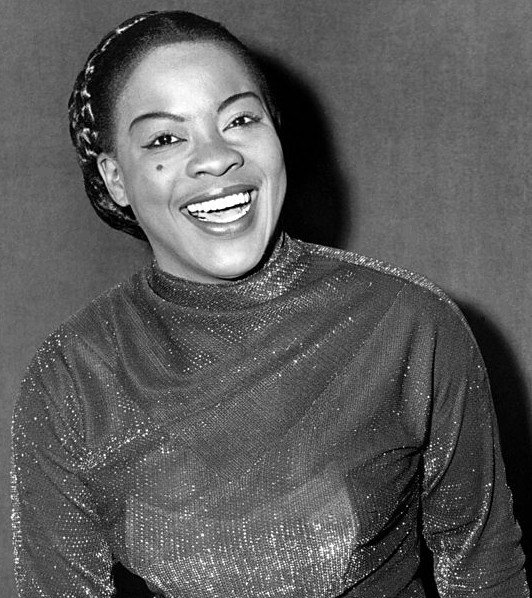
MORE LONNIE JOHNSON
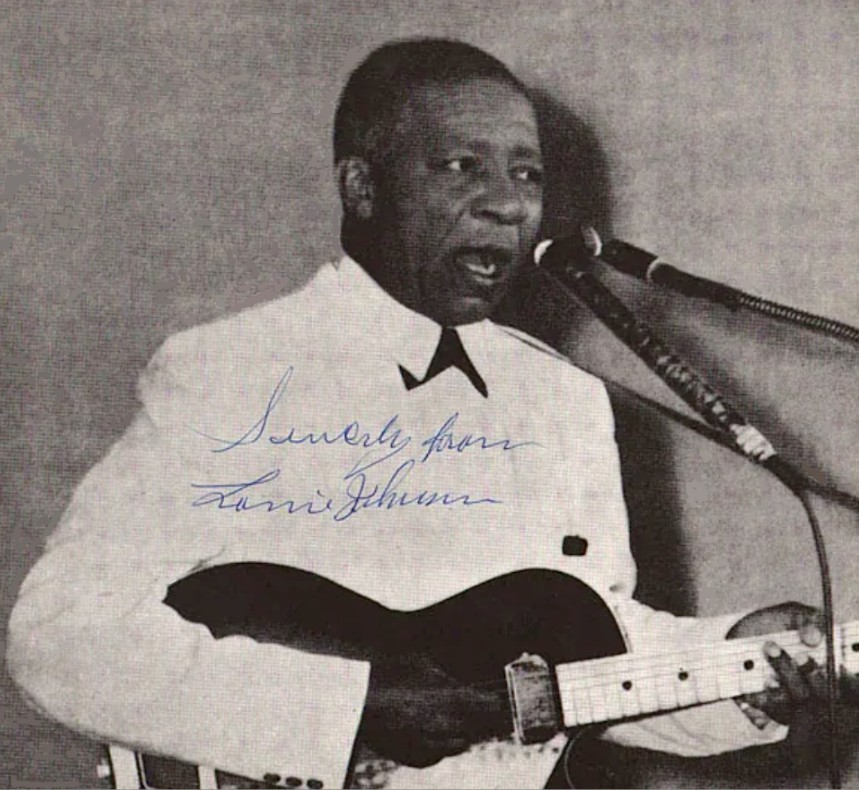
|
Above: Autographed photo of Lonnie Johnson.
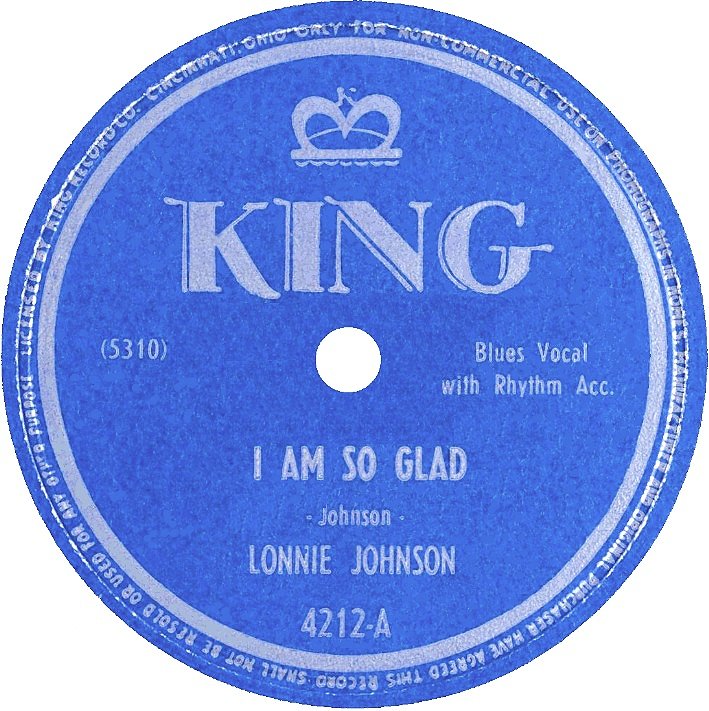
|
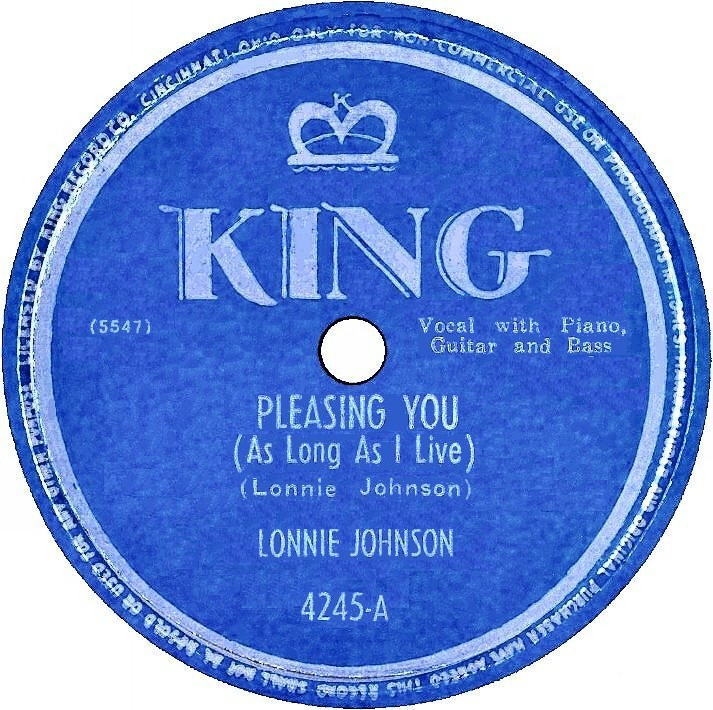
|
Above Left: Label image of King 4212-A, released in March 1948. Both sides of this record were composed by Lonnie Johnson, confirmed at BMI.com. Above Right: Label image of King 4245-A, released in October 1948. Again both sides composed by Lonnie Johnson, "Pleasing You" garnering a BMI Award Winning Song.
Cash Box Review (10/16/48):
LONNIE JOHNSON — King 4245....Pleasing You/Feel So LonesomeThereís no stopping this lad! Bouncing right back with another potential coin winner, Lonnie Johnson sets right with music ops via this disking hailed "Pleasing You" and "Feel So Lonesome".
Songs fit Johnsonís pipes like a glove and are sure to meet with wide approval from the rapidly gathering clan of fans of Lonnieís. Top deck is soft and way down low, with Lonnieís pipes and guitar in a well deserving spotlight.
Lyrics on the backside echo the title with Lonnieís fond tonsils giving their all for music ops in the fashion that counts. Itís money in the bank with this pair.
The Billboard Review (10/30/48):
LONNIE JOHNSON — King 4245
Pleasing You (86) A sock vocal and persuasive culturing by the race star on a ballad of his own composition that could be the follow -up to his 'Tomorrow Night" smash.
Feel So Lonesome (79) Easy warbling and crying guitar work on a blues original.(NOTE: Ratings had a range of 0-100 with 70-79 considered as "good" and 80-89 as "excellent".)
Cash Box Review (5/5/51):
LONNIE JOHNSON — King 4245....Good Night Darling/Fallin' Rain BluesA pleasant sleep song is delivered softly on the upper deck by Lonnie Johnson. With an excellent guitar backing, Lonnie lends a lot of charm to this side. The bottom half is a shouting blues number which gets a steady beat and a blazing vocal. This'll get those coins into the machines.
LISTEN (Windows Media Player):
1. "I Am So Glad" - Lonnie Johnson - King 4212-A - 1948.
2. "Working Man's Blues" - Lonnie Johnson - King 4212-B - 1948.
3. "Pleasing You" - Lonnie Johnson - King 4245-A - 1948.
4. "Feel So Lonesome" - Lonnie Johnson - King 4245-B - 1948.
5. "Fallin' Rain Blues" - Lonnie Johnson - King 4450-A - 1951.
6. "Good Night Darling" - Lonnie Johnson - King 4450-AA - 1951.ALL SIX SONGS played in sequence.
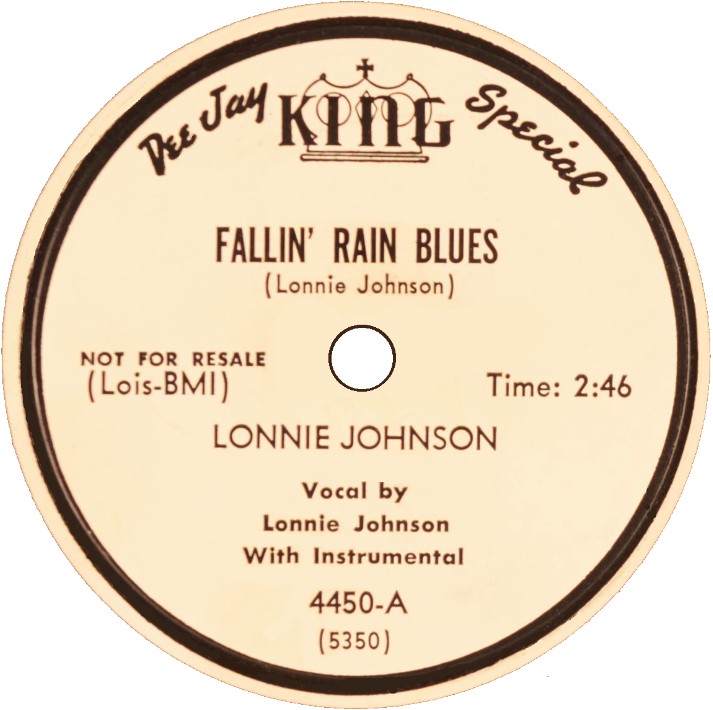
Directly Above: Label image of King 4450-A, released in March 1951. The flip-side is "Good Night Darling". As usual, Lonnie composed both sides of this record.
The year 1951 was big for Lonnie with eight records released on the King label in that time period. Wynonie Harris took second place with six King records in 1951.
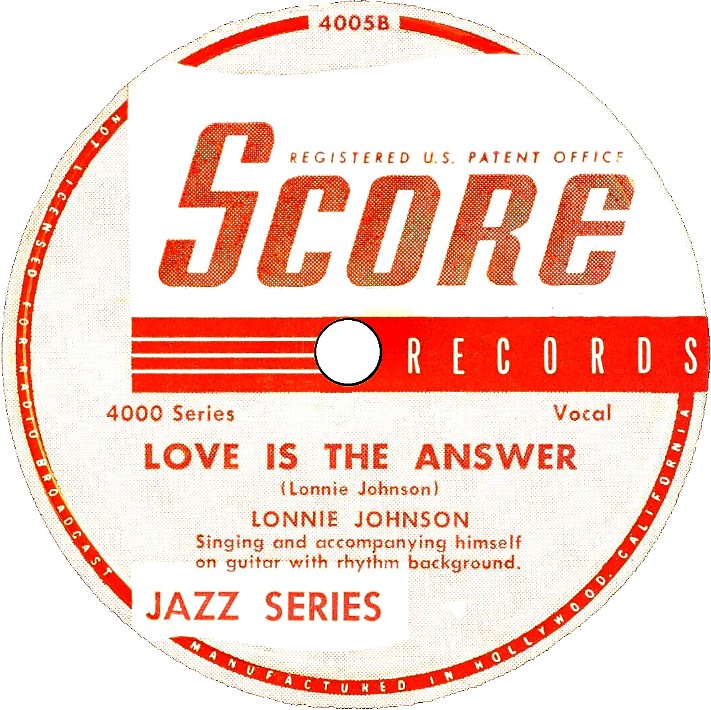
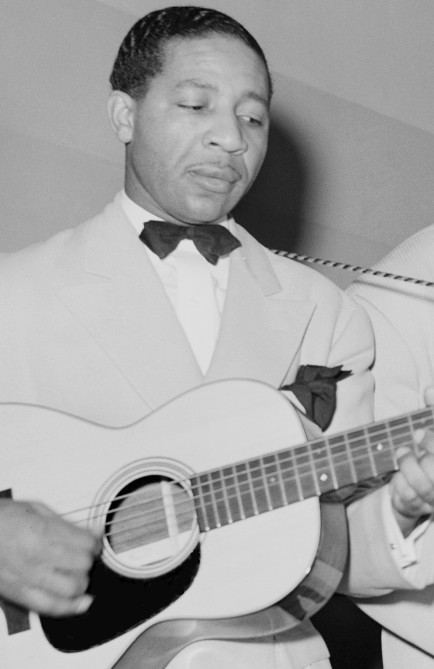
At Far Left: Label image of Score 4005B, recorded in June 1947 and released in November 1948. Score was a subsidiary label of Aladdin Records, located in Hollywood, California. This fancy, colorful label would certainly catch the record buyer's eye!
And, yes, both sides were composed by Lonnie Johnson. Lonnie is credited with 313 song titles at BMI.com, winning a BMI Award for "Pleasing You (As Long As I Live)".
These sides were originally released on Aladdin 197 in 1947. Lonnie had two more records on Aladdin from the same 1947 recording session, those released in 1949 and 1950.
At Direct Left: Photo of Lonnie Johnson.
The Billboard Review (11/13/48):
LONNIE JOHNSON — Score 4005
Love Is The Answer (83) An easy-rocking blues styled ballad original, with Lonnie warbling and accompanying himself in characteristic relaxed manner. Good rhythm backing.
How Could You? (80) Medium tempo blues swings under the skilled Johnson ministrations.(NOTE: Ratings had a range of 0-100 with 80-89 considered as "excellent".)
LISTEN (Windows Media Player):
1. "Love Is The Answer" - Lonnie Johnson - Score 4005B - 1948.
2. "How Could You?" - Lonnie Johnson - Score 4005A - 1948.BOTH SONGS played in sequence.
EXTRA RECORD — PLEASIN' YOU (AS LONG AS I LIVE)
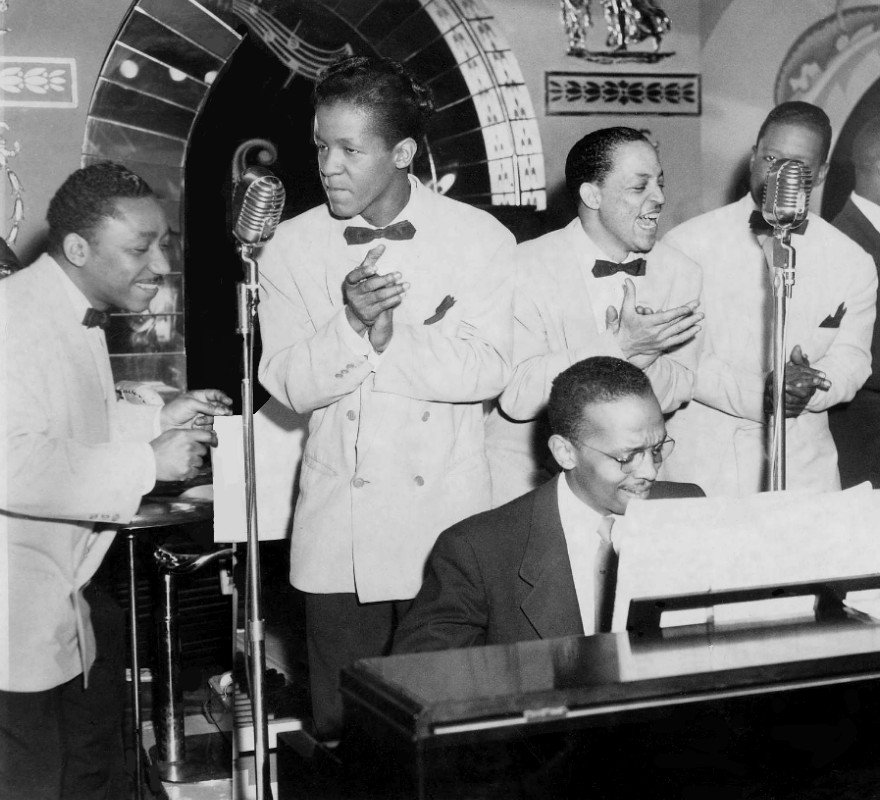
|
Above: Photo of The Striders, (L-R Standing) Ernest Griffin, Gene Strider, Charles Strider, and James Strider.
(NOTE: The original of this photo, subsequently modified, was provided by Jeff Beckman.)
Click HERE for an article about The Striders by Marv Goldberg. (Will open in a separate window)
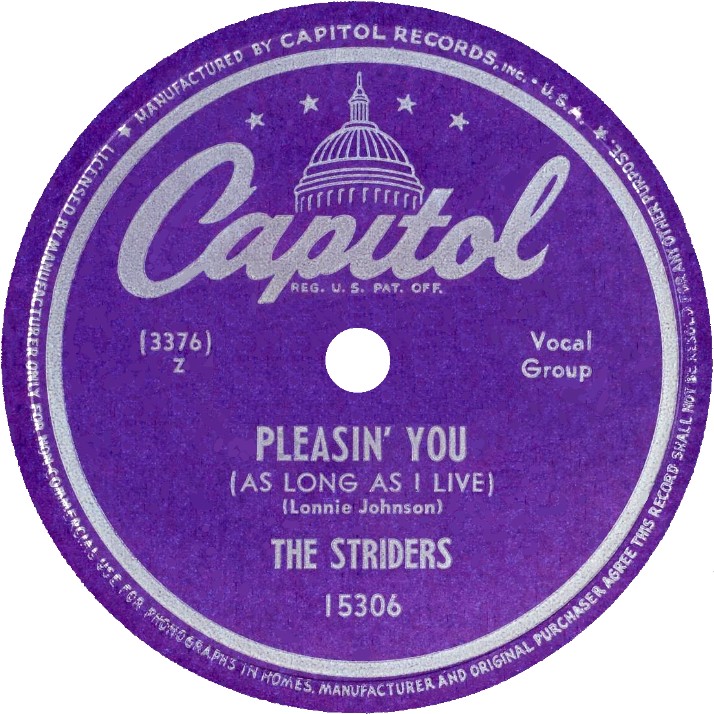
|
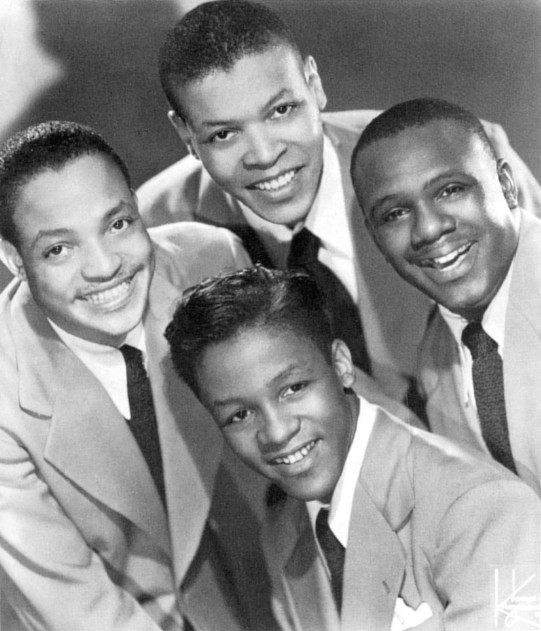
|
Above Left: Label image of Capitol 15306, released in November 1948. Above Right: Circa 1948 photo of The Striders, (Top L-R) Charles Strider, James Strider, Ernest Griffin, and (Bottom) Eugene Strider (lead singer).
This is The Striders' only release on Capitol. They also had releases on Mystery (1949), Apollo (1950, 1955), Regal (1951), and Derby (1954). In addition, they backed up Dolores Martin on Mystery (1949); Savannah Churchill on Arco (1949-1950), Regal (1951), and RCA Victor (1952); and Bette McLaurin and Maureen Cannon on Derby (1952).
At Direct Right: Savannah Churchill And The Striders. (Photo provided by Jeff Beckman.)
(L-R) Ernest Griffin, Gene Strider, Savannah, James Strider, and Charles Strider.Cash Box Review (12/18/48):
THE STRIDERS — Capitol 15306....
Somebody Stole My Rose Colored Glasses/Pleasin' YouOpening with a new, sweet, soft and sentimental arrangement, The Striders sell a grand tune with even grander lyrics, "Somebody Stole My Rose Colored Glasses" to a fare-thee-well. A sure pop for any op who wants a harmonious platter that will grab attention on any one of his locations. The Striders handle this side with soft and easy harmony and turn it into an excellent recording.
On the flip with "Pleasiní You", they once again do a very, grand job with this tuneful ballad. Hereís a platter you can bank on. Just listen in.
The Billboard Review (12/25/48):
THE STRIDERS — Capitol 15306
Pleasin' You (77) First disking by a new group; the Lonnie Johnson hit race tune is cleanly but not stirringly interpreted.(NOTE: Ratings had a range of 0-100 with 70-79 considered as "good".)
The Billboard reviewed the same record a second time a week later:
The Billboard Review (1/1/49):
THE STRIDERS — Capitol 15306
Pleasin' You (71) Group sound much like the Mills Brothers on the wistful new Lonnie Johnson tune, but don't come up to Johnson's own version.LISTEN (Windows Media Player):
"Pleasin' You (As Long As I Live)" - The Striders - Capitol 15306 - 1948.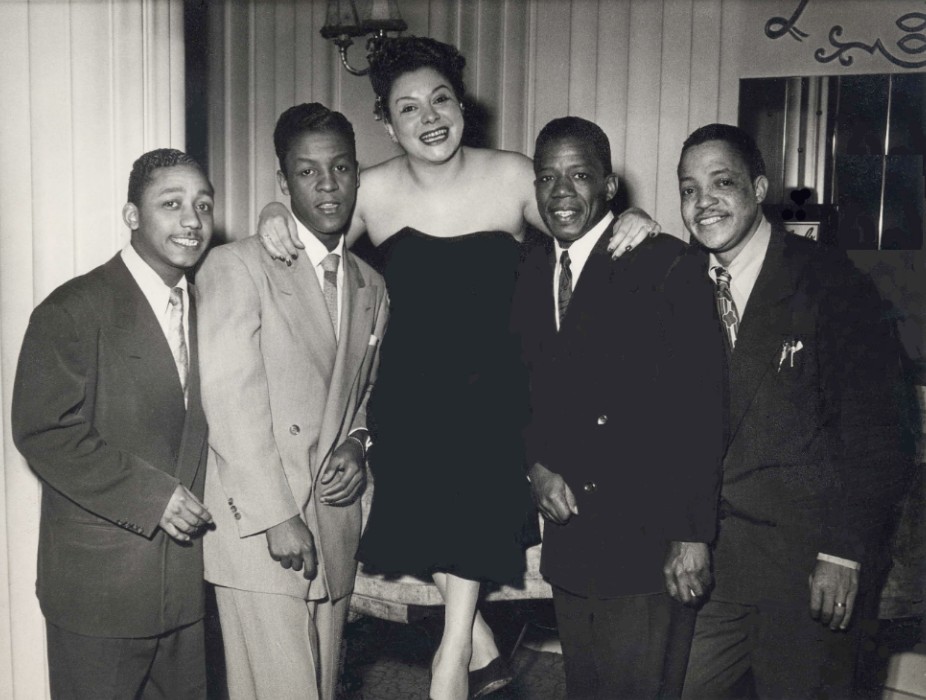
WYNONIE HARRIS Wynonie Harris, from Omaha, Nebraska, was a blues singer. He joined Lucky Millinder's orchestra in 1944, resulting in a big 1945 hit, "Who Threw The Whiskey In The Well". Wynonie would rejoin Millinder on the King label in 1950.
Between 1945 and joining King Records in 1947, he recorded for several different record labels, including Aladdin and their subsidiary Philo, Apollo, Bullet, and Lionel Hampton's Hamp-Tone.
He stayed with King until 1954 resulting in many hit songs for them.
CASH BOX, December 6, 1947: KING RECORDS PACT WYNONIE HARRIS
CINCINNATI—Syd Nathan, president of King Records, this city, announced the signing of Wynonie "Blues" Harris to an exclusive long-term recording contract this past week. King disclosed that Harris will soon wax 20 sides for the Cincinnati diskery in order to build up enough masters for release throughout the coming year.Nathan asserted that although Harris had recorded for a number of companies in recent years, he had never had the benefit of a nation-wide promotion campaign behind him.
Nathan further disclosed that plans for Harris included full scale promotion among disc jockeys, juke box operators, and dealers.
THE BILLBOARD, December 20, 1947: APOLLO VS. KING ON HARRIS DEAL
NEW YORK—Apollo Records, late this week, served papers on King diskery in an effort to restrain blues singer Wynonie Harris from going with the King firm. The Apollo firm claims that it has a prior contract which would hold priority over any that King holds.The King outfit signed la Harris to a three-year pact in November and has already released the blues chanter's initial biscuit on the label.
CASH BOX, December 13, 1947: KING RECORDS DEAL WITH WYNONIE HARRIS UP IN AIR
CINCINNATI—The reported signing of Wynonie Harris to a King Recording contract this week takes on other aspects. Kingís disclosure that the deal is not set as yet, points to an alleged report that another diskery had already signed the blues artist.King last week released a statement that the diskery had signed Harris to a long term recording contract.
THE BILLBOARD, December 27, 1947: APOLLO WITHDRAWS SUIT
CHICAGO—Court action involving the right of Negro blues singer Wynonie Harris to sign a contract with King Records has been withdrawn by Apollo Records, it was learned this week.Apollo last week had served notice that it would attempt to restrain the singer from recording with the Cincinnati firm, claiming that Harris had a prior contract with them.
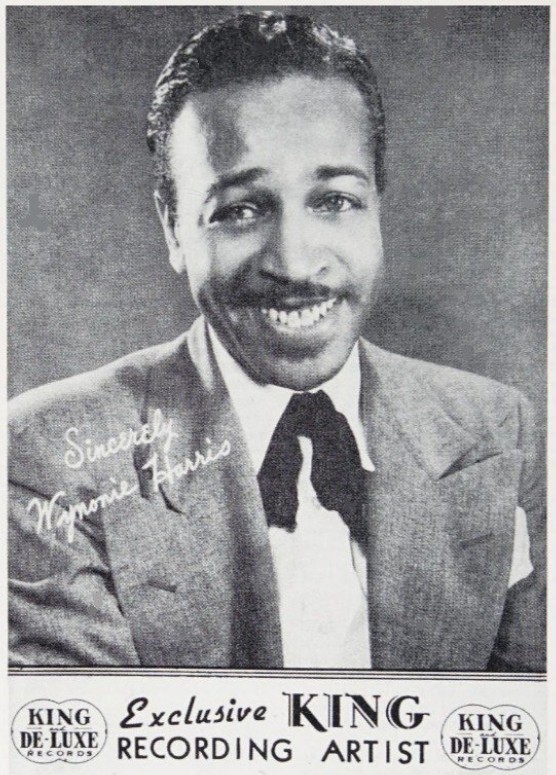
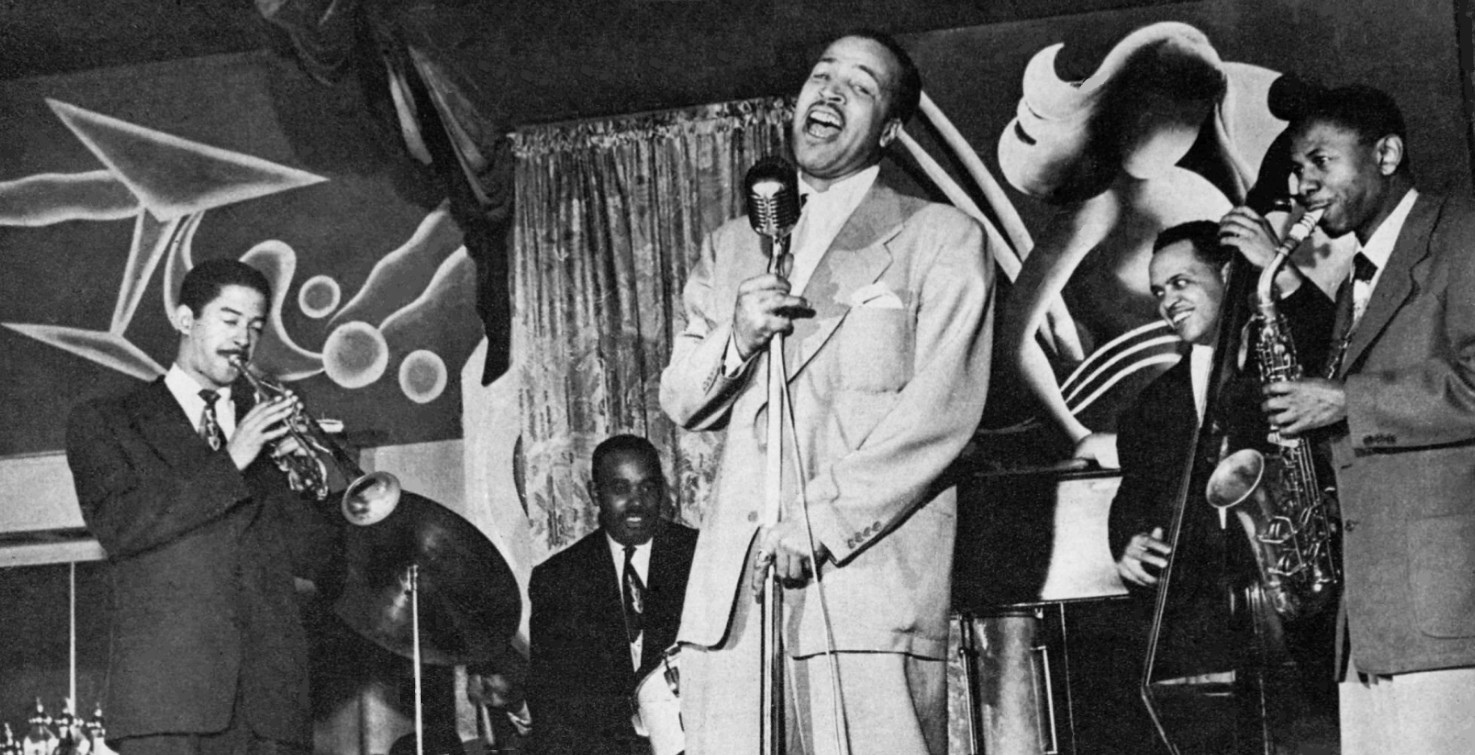
|
Above: Photo of Wynonie Harris and his band.
Above Left: Label image of King 4210-A, released in March 1948. "Good Rocking Tonight" was composed by Roy Brown, who had his own version of the song on the DeLuxe label in 1947. DeLuxe didn't become a King Records subsidiary until February 1951. The flip-side, "Good Morning Mr. Blues", may be where Wynonie got his nick name. Wynonie Harris' "Good Rockin' Tonight" reached #1 Best Selling Race Record in June 1948 and stayed in the top 15 into November 1948.
Wynonie released another Roy Brown composition, "I Want My Fanny Brown", on King 4304-A in 1949.
Above Middle: CASH BOX, April 2, 1949.
Above Right: Label image of King 4378-AA, released in June 1950. Wynonie's songs were "good", three of the song titles of the above records start with the word "good". The flip-side, "Stormy Night Blues", has vocal group backing.
CHICAGO TRIBUNE, May 8, 1995:
WYNONIE HARRIS LIVED THE LIFE HE SANG ABOUT
Born in Omaha, Harris parlayed a natural talent for dancing into a series of gigs at local bars, where he began singing. Influenced by Kansas City greats Big Joe Turner and Jimmy Rushing, he left for Los Angeles in 1940, establishing himself as a potential star along the city's bustling Central Avenue nightlife strip.Harris joined the popular big band of Lucky Millinder in 1944. His first recording with Millinder's outfit was the rousing R&B chart-topper "Who Threw the Whiskey in the Well?" A year later, Harris was on his own, recording for Apollo, Bullet and Aladdin before landing at Cincinnati-based King Records in 1947 (where he remained for the next seven years).
Between 1948 and 1952, Harris scored 13 R&B hits for King. His storming cover of Roy Brown's "Good Rockin' Tonight" ranks as a seminal recording of the pre-rock era....
Harris innovatively turned the country tunes "Good Morning Judge" and "Bloodshot Eyes" into R&B smashes and cut countless amusing odes to liquor's effects (both positive and negative).
Harris consistently pushed the lyrical envelope with double-entendre gems such as "Keep On Churnin'" and "I Like My Baby's Pudding". His live performances and offstage demeanor were apparently even more ribald.
During the hitmaking years, Harris lived the high life. He bought a house in an affluent New York neighborhood (where he allegedly entertained women while his wife was in residence). He toured extensively, playing top theaters such as the Apollo in Harlem and Chicago's Regal.
But "Quiet Whiskey" (to quote one of Harris' wildest rockers) took its inevitable toll. After a couple of abortive attempts to adapt to the mid-1950s rock 'n' roll boom and a few too many burned bridges, Harris sadly faded from sight. His bigger-than-life persona was relegated to occasional low-profile club gigs.
PITTSBURGH COURIER, April 16, 1949: POLL WINNERS GET AWARDS
NEW YORK—....As for the concert itself, it jumped off to a fast start and never faltered its pace from beginning to end. A boatload of stars performed... Willie Bryant, popular Station WHOM disk jockey, emceed the broadcast portion of the show.... Wynonie Harris, who sang "Good Rockin' Tonight", proved that he deserved to win the title of top blues singer. Wynonie is a salesman...The Cash Box Review (7/1/50):
WYNONIE HARRIS — KING 4378.... Good Morning Judge/Stormy Night Blues
Fresh' wax out of the Wynonie Harris stable, and the set up of a pair that should score in a big way for the ork leader. Both sides of this have the spark and tint of juke box coin play all about them, and are tailor made for the phono trade.The top deck, "Good Morning Judge" has Wynonie on the vocals, wailing a clever story that should sit well with his many fans, and garner a few new ones in the making. Ditty rolls along in mellow manner, with the Harris aggregation making pleasing music in the background. It's the sort of wax that consistently wins peak play in the boxes, and is a cinch to whirl at a merry pace once this biscuit gets around.
Coupling is in the blues vein, and has the maestro basking in the spotlight once again. Tempo on this end is a bit slower, and features Wynonie and the gang delivering a top notch bit of blues material. Disk is a must for music ops' machines—get with it!
The Billboard Review (7/15/50):
WYNONIE HARRIS — KING 4378
Good Morning Judge (72) Mr. Blues departs from his usual material as he tackles a humorous hillbilly jingle. Warbling drives, combo hits light and easy.
Stormy Night Blues (83) Arresting slow blues, with Harris shouting hard and fierce, backed by combo and first-class vocal group.(NOTE: Ratings had a range of 0-100 with 70-79 considered as "good" and 80-89 as "excellent".)
LISTEN (Windows Media Player):
1. "Good Rockin' Tonight" - Wynonie Harris - King 4210-A - 1948.
2. "Good Morning Mr. Blues" - Wynonie Harris - King 4210-B - 1948.
3. "Good Morning Judge" - Wynonie Harris - King 4378-AA - 1950.
4. "Stormy Night Blues" - Wynonie Harris (And Vocal Group) - King 4378-A - 1950.ALL FOUR SONGS played in sequence.
EXTRA RECORD — GOOD ROCKING TONIGHT
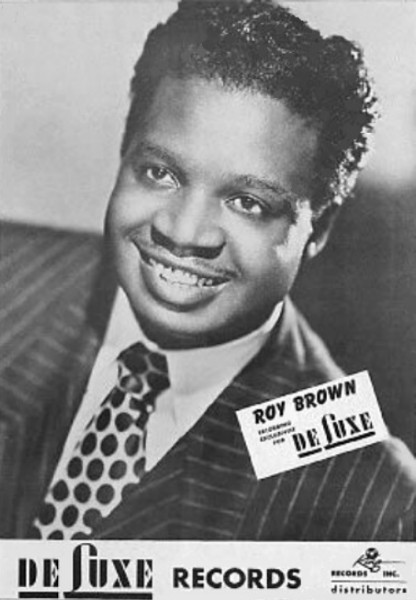
|
|
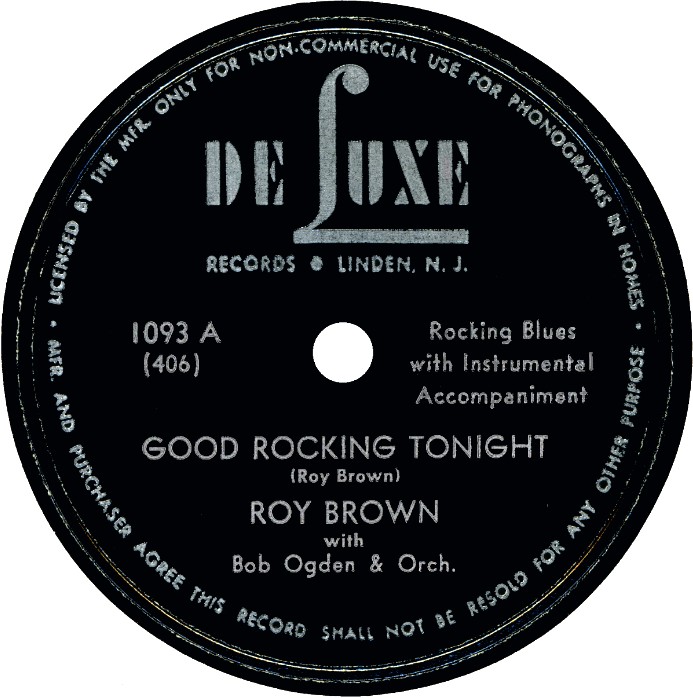
|
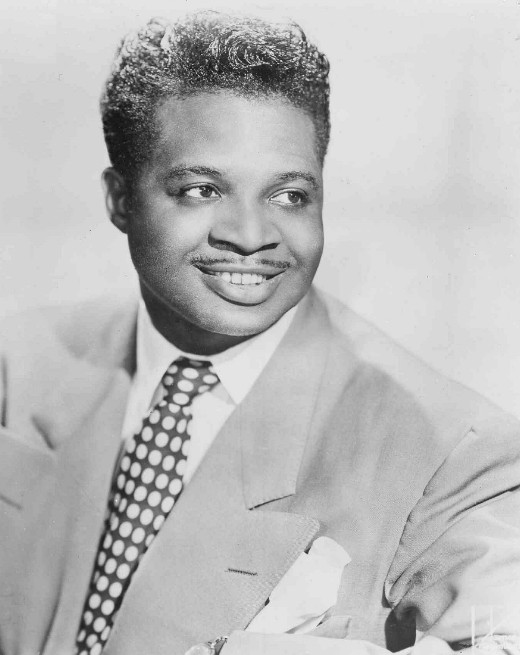
|
Above Left: Label image of DeLuxe 1093 A, released in October 1947. The lyrics to this song include "I'm a mighty mighty man." After it became a hit, Roy Brown named his band "His Mighty Mighty Men". Others to record "Good Rocking Tonight" include Elvis Presley (1954), The Treniers (1956), Ricky Nelson (LP, 1958), Carl Perkins (LP, 1958), Jimmy Witherspoon (LP, 1958), and Jimmy Rushing (LP, 1959).
Above Right: Photo of Roy Brown. As you probably noticed, Roy liked polka-dot ties.
CASH BOX, December 6, 1947:
....Keep your eyes peeled for "Good Rockin' Tonight" on DeLuxe Records. New Orleans operators report the ditty going mad....LISTEN (Windows Media Player):
"Good Rocking Tonight" - Roy Brown - DeLuxe 1093 A - 1947.
ROY BROWN RECORDED SIXTEEN RECORDS ON THE KING LABEL (1952-1955). HE WILL BE INCLUDED AGAIN IN A FUTURE PART OF THIS ARTICLE.
MORE WYNONIE HARRIS
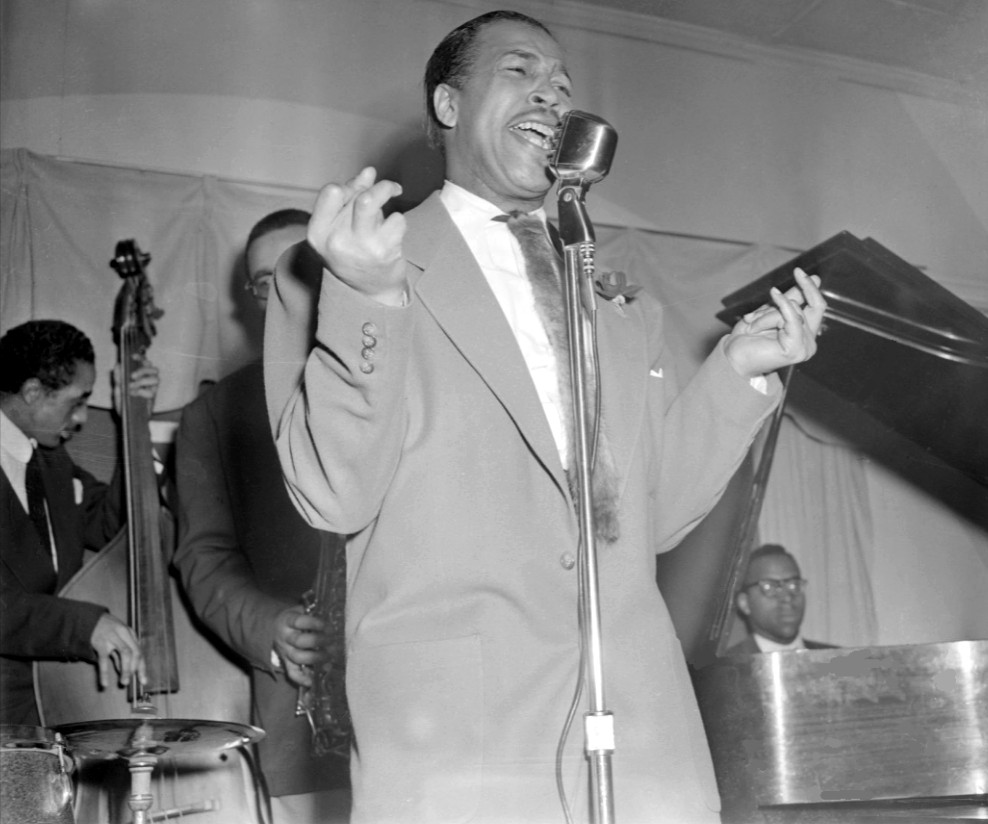
|
Above: Photo of Wynonie Harris and his band.
(Courtesy of the Indiana Historical Society)
Above Left: Photo of Wynonie Harris.. Above Middle: Label image of King 4461-AA, released in June 1951. "Bloodshot Eyes" is a BMI Award Winning Song composed by Hank Penny and Harold Hensley. Penny was first to release it, as a country & western song on King 828-A in December 1949.
Listen for the line "Your eyes look like two cherries in a glass of buttermilk..."
The flip-side, "Confessin' The Blues" was written by Walter Brown and Jay McShann. It was first released on Decca in 1941 by Jay McShann At The Piano, vocal by Walter Brown. McShann And His Jazzmen released the song on the Philo label in 1945, vocal by Jimmy Witherspoon. The song was also released by Brown on King's subsidiary label, Queen, in January 1946.
Above Right: Another photo of Wynonie Harris, apparently from the same photo session.
At Direct Right: Yet another photo of Wynonie Harris.
The Cash Box Review (7/7/51):
WYNONIE HARRIS — KING 4461.... Good Morning Judge/Stormy Night Blues
Wynonie Harris gives out with a hoarse rendition of a ditty with a beat on the upper level. Beating it home, Wynonie runs through the clever lyrics as though he meant them.The second side is a country blues number right up his alley. This is right for ops.
The Billboard Review (7/7/51):
WYNONIE HARRIS — KING 4461
Bloodshot Eyes (84) Wynonie has a big ball with this rocking hillbilly comic novelty, ideal material for his special brand of shouting. Combo does an exciting hand-clapper in back.
Confessin' The Blues (80) The shouter does a serious blues, sells it convincingly. Tune is practically a blues standard.(NOTE: Ratings had a range of 0-100 with 80-89 considered as "excellent".)
LISTEN (Windows Media Player):
1. "Bloodshot Eyes" - Wynonie Harris - King 4461-AA - 1951.
2. "Confessin' The Blues" - Wynonie Harris - King 4461-A - 1951.BOTH SONGS played in sequence.
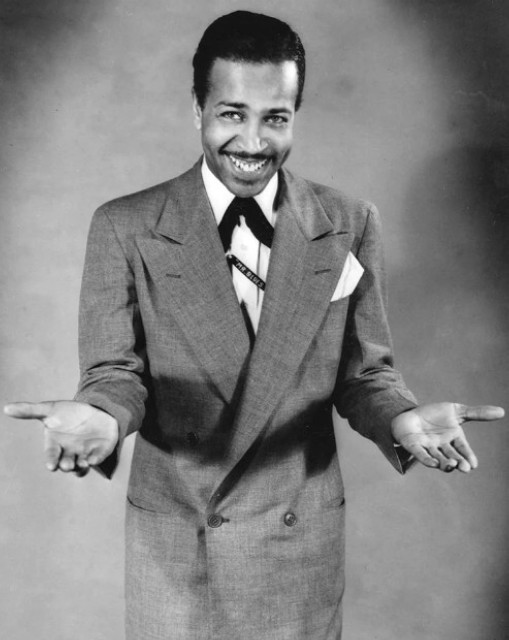
Above Left: Label image for Vogue V2127 "Bloodshot Eyes". The upside-down "King 9031" is the King Records matrix number.
Above Right: Circa 1952 photo of Wynonie Harris, at the microphone, and his band.
(Courtesy of the Kansas City Museum)
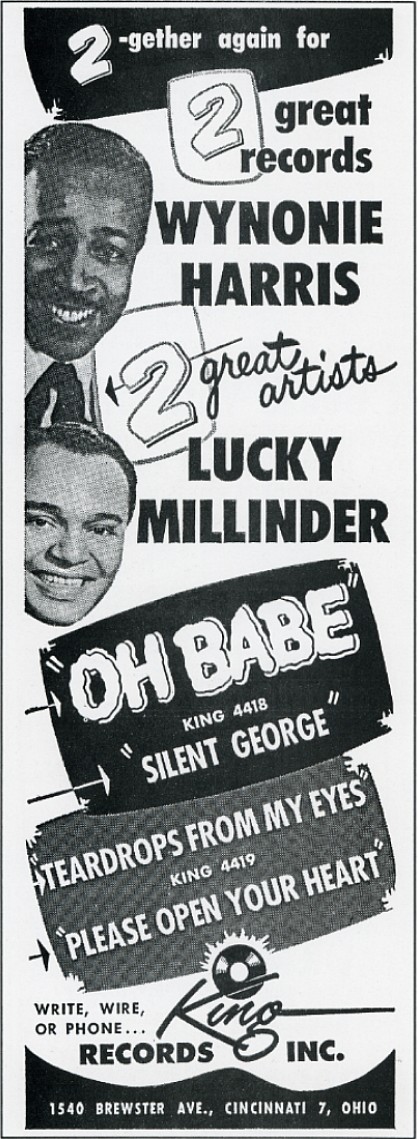
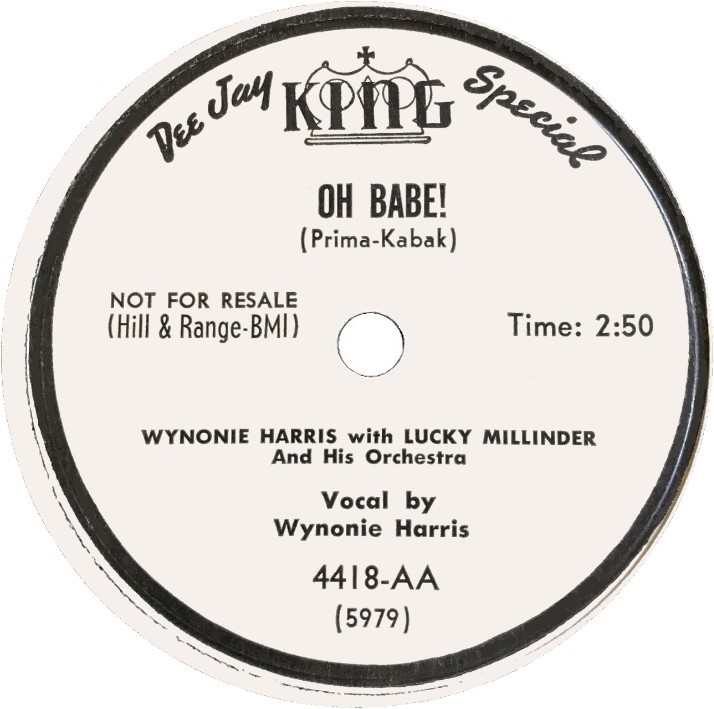
At Left: King Records clipping from November 1950.
Above: Label image for King 4418-AA. Both sides were recorded on October 18, 1950. The orchestra provides vocal backing on both songs.
"Oh Babe!" is a song composed by Louis Prima and Milton Kabak. It was introduced on record by Prima and Keely Smith on Prima's new Robin Hood label in September 1950. The flip-side, "Silent George", was composed by favorite songwriters, Henry Glover and Sally Nix. Vocal is by Myra Johnson.
The Cash Box Review (11/18/50):
LUCKY MILLINDER — KING 4418.... Oh Babe/Silent George
Lucky Millinder and Wynonie Harris combine to turn out a good version of a current rhythm number.The orchestra provides a loud accompaniment as Wynonie gives the lyrics a going over.
Flip has Myra Johnson shouting a vocal to another terrific Millinder orchestration. This one is right for machines.
LISTEN (Windows Media Player):
1. "Oh Babe!" - Wynonie Harris With Lucky Millinder And His Orchestra
- King 4418-AA - 1950.
2. "Silent George" - Myra Johnson With Lucky Millinder And His Orchestra
- King 4418-A - 1950.BOTH SONGS played in sequence.
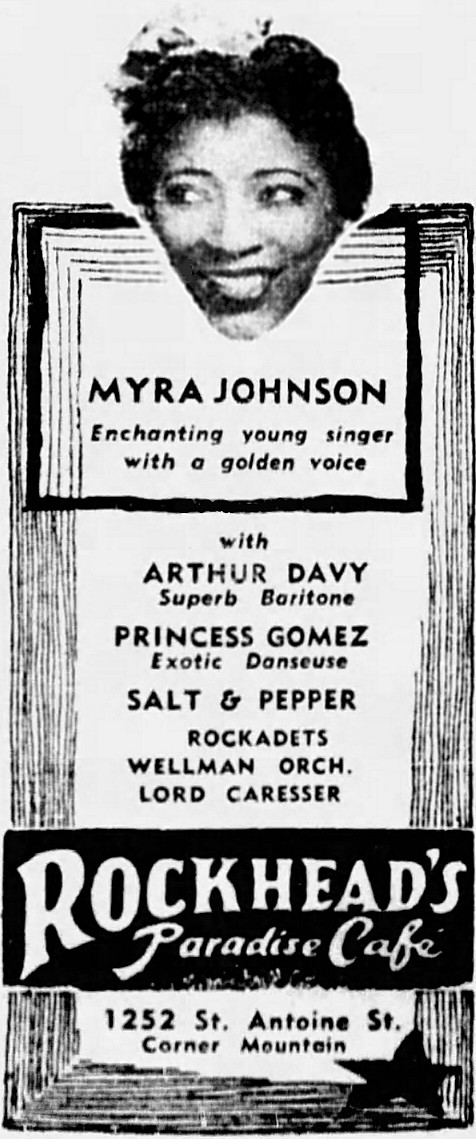
Above: THE GAZETTE (Montreal, Canada), March 22, 1950:
[Myra Johnson]
NOTE: The "young singer" description is a little deceptive.
Myra started her singing career in the early 1930s.
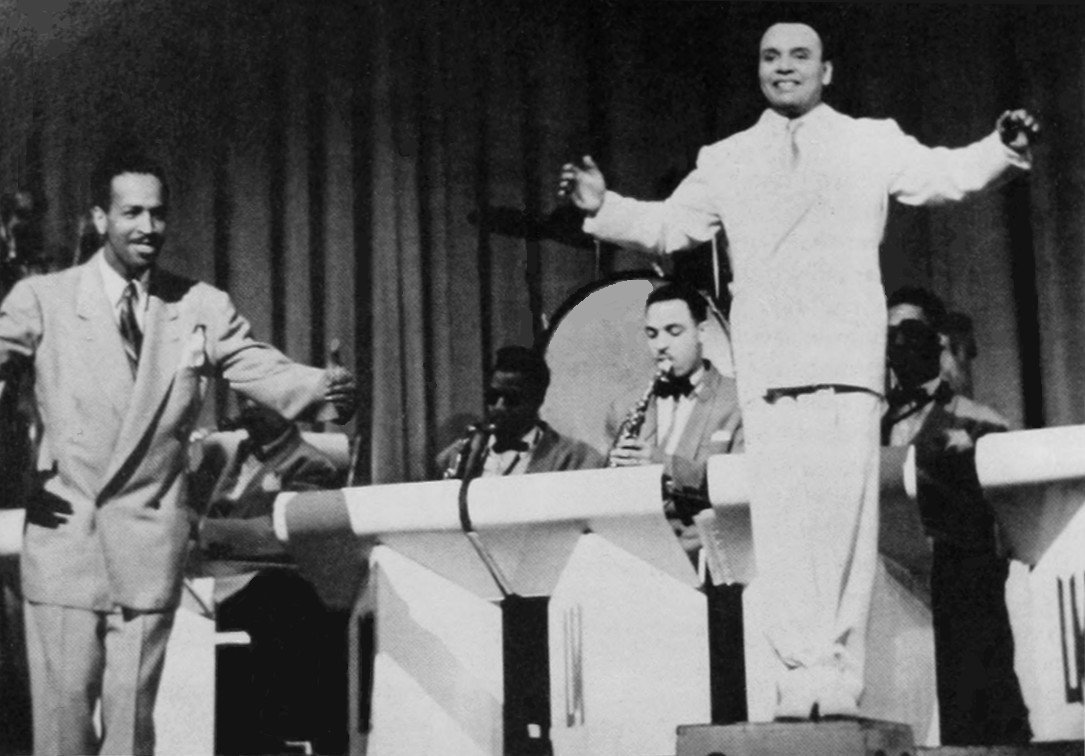
|
Above: Photo of Wynonie Harris performing with Lucky Millinder and his orchestra.
Lucky was a short guy... here he is standing on a pedestal.
MABEL SMITH (AKA BIG MAYBELLE)
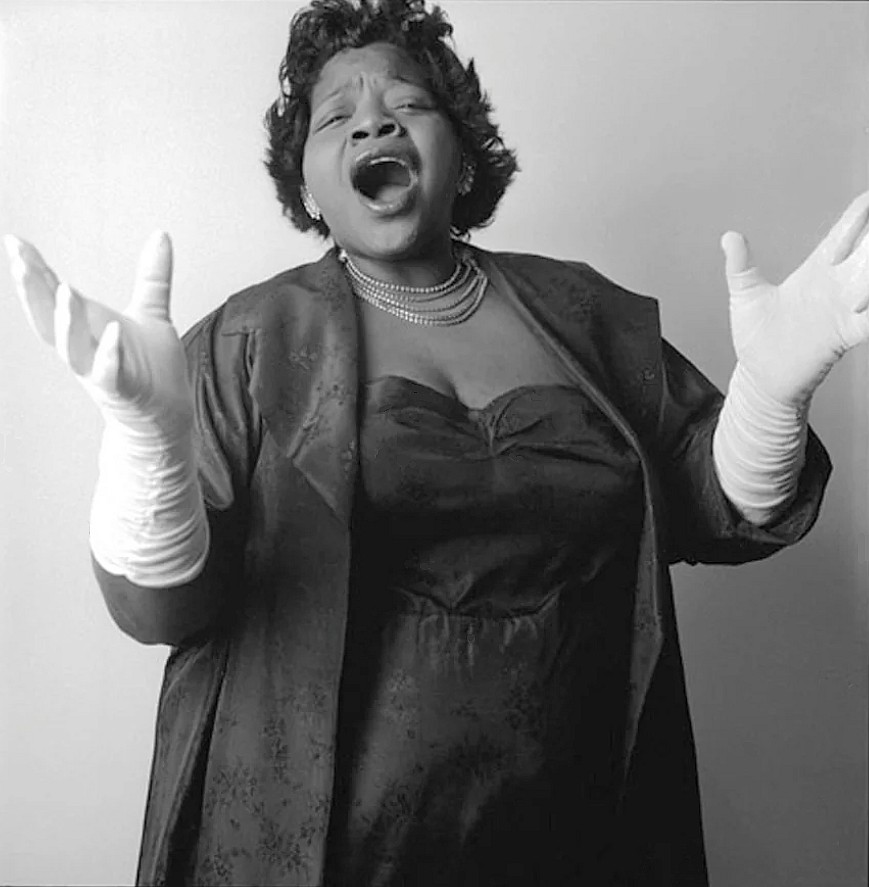
|
Above: Photo of Mabel Smith (Big Maybelle).
Above Left: Photo of Mabel Smith (Big Maybelle). Above Middle: Label image for King 4227-A, released in May 1948. There are 66 song title credits at BMI.com and 96 at ASCAP.com for "Indian Giver", but none show either "Jacobs" or "Blackman" as composers.
Mabel Smith had seven records released on the King label (1948-1950). After leaving King, she recorded as "Big Maybelle" for OKeh (a Columbia subsidiary) and then Savoy Records.
Above Right: A bookend photo of Mabel Smith (Big Maybelle).
LISTEN (Windows Media Player):
1. "Indian Giver" - Mabel Smith - King 4227-A - 1948.
2. "Too Tight" - Mabel Smith - King 4227-B - 1948.BOTH SONGS played in sequence.
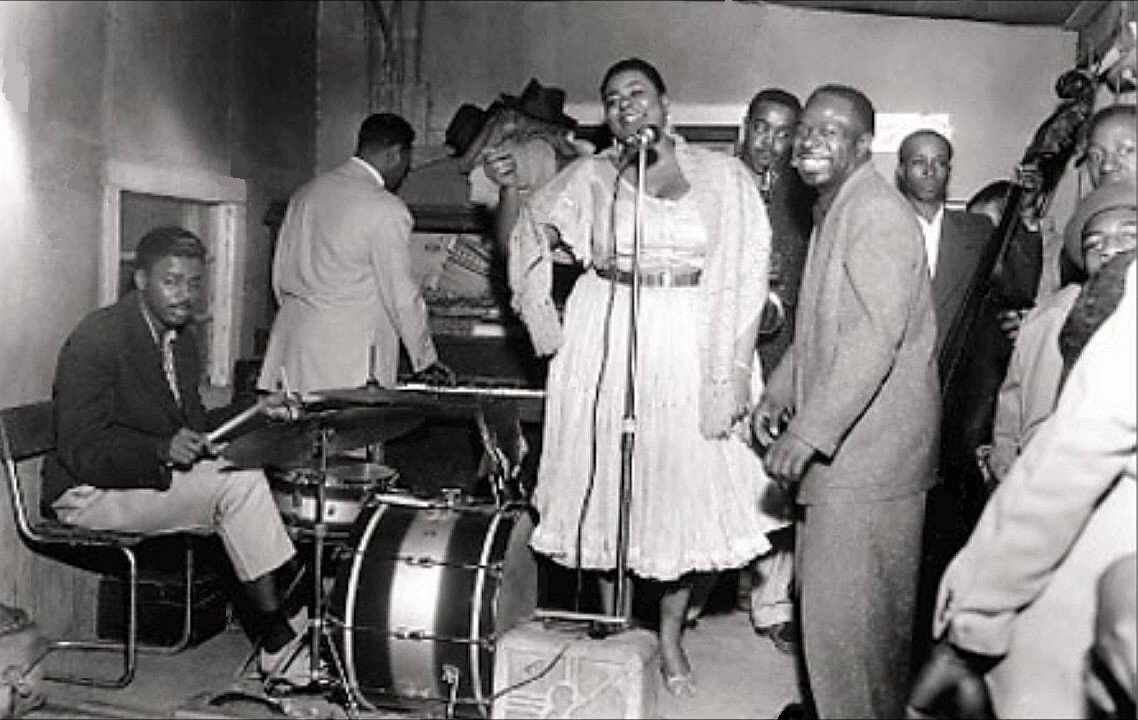
|
Above: Photo of Mabel Smith (Big Maybelle) performing.
EXTRA RECORD — MABEL SMITH
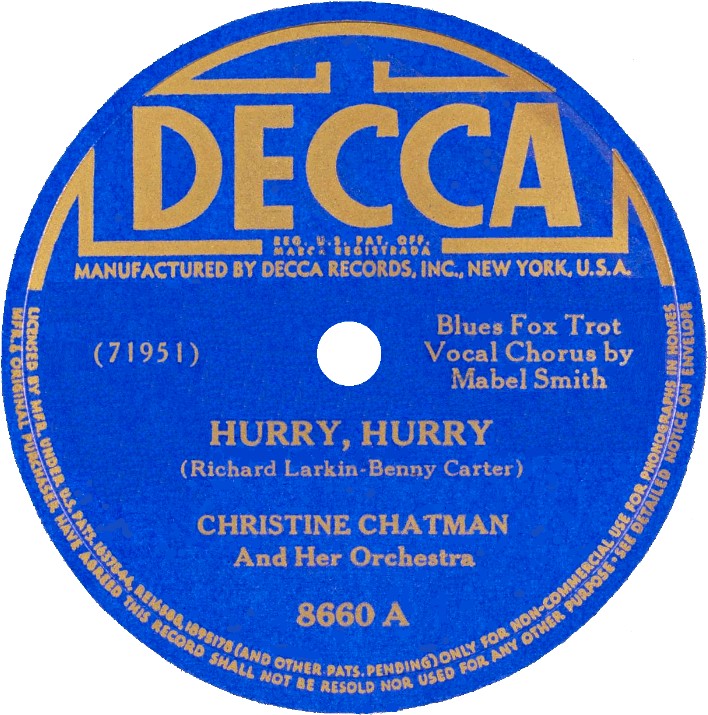
|
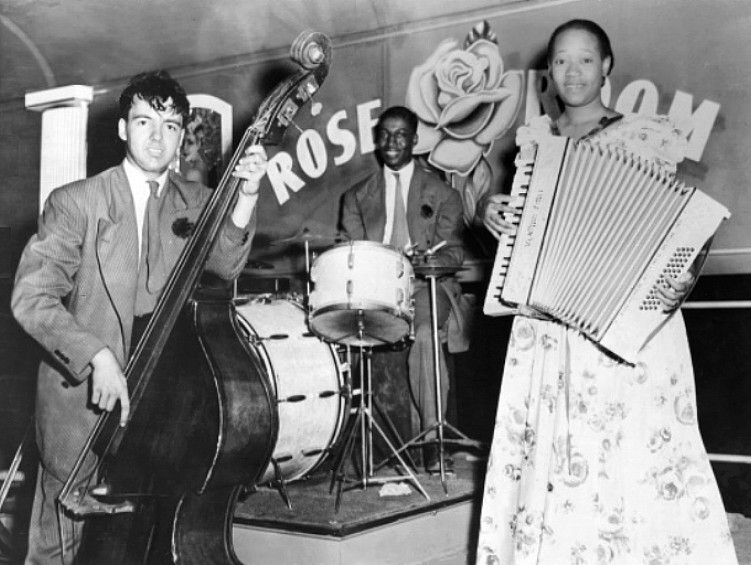
|
Above Left: Label image of Decca 8660 A, released in 1944. In 1945 Mabel was being billed as "MayeBelle Smith" and just "Maye Belle". The flip-side of this record is an instrumental by Christine Chatman And Her Orchestra. "Hurry Hurry" was composed by Richard Larkin and Benny Carter. Larkin was also known as Dave Dexter Jr., an executive at Capitol Records at the time that Benny Carter's orchestra was recording for that label.
Also, at that time, Savannah Churchill, who was the featured singer with Carter, released "Hurry Hurry" backed by Carter's orchestra on Capitol in January 1944. It was the first of two records they had on Capitol, both released in 1944.
"Hurry Hurry" was also released by Lucky Millinder's orchestra, vocal by Wynonie "Mr. Blues" Harris, on the black Decca label in 1944.
Above Right: Photo of Christine Chatman and band performing. Christine played both the piano and accordian. She was also featured as a vocalist. Christine was described as "The Sepia Goddess Of Swing" and "The Boogie Woogie Queen".
THE BILLBOARD 1943 MUSIC YEAR BOOK:
....Christine started her career with Alar Green's band as pianist and later was featured as vocalist and pianist with Snookum Russell's band. She organized her present outfit early this year and is rated as an unusual find....At Direct Right: ROANOKE TIMES, August 17, 1943.
At Far Right: ROANOKE TIMES, August 31, 1945.
The Billboard Review (7/15/44):
CHRISTINE CHATMAN (VOCAL BY MABEL SMITH) — DECCA 8660A....
Hurry Hurry — Plenty hot, without being too lowdown, this Decca "sepia" series platter is going to hit the nickels heavy, not only in the race spots but in any spot after midnight.The arrangement is plenty solid and while Mabel Smith gets a little shrill at times, some juke spots need that shrillness to ride over the crowd noises.
Tune down the volume and the disk becomes a swell number for the home and therefore it'll clear the record retail counters with a Jump.
LISTEN (Windows Media Player):
1. "Hurry Hurry" - Christine Chatman Orchestra (Vocal By Mabel Smith) - Decca 8660 A - 1944.FOR COMPARISON PURPOSES:
2. "Hurry Hurry" - Benny Carter Orchestra (Vocal By Savannah Churchill) - Capitol 144 - 1944.
3. "Hurry Hurry" - Lucky Millinder Orchestra (Vocal By Wynonie Harris) - Decca 18609 A - 1944.ALL THREE SONGS played in sequence.
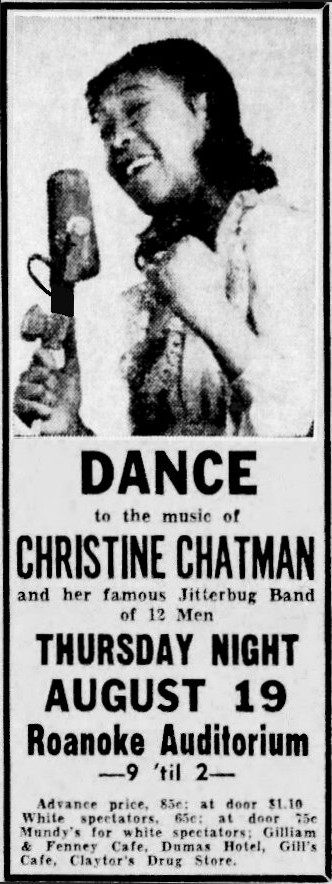

TINA DIXON Tina Dixon, from Detroit, was a blues singer and composer.
The Billboard 1945 Year Book provides us with: "Detroit's Tina Dixon, the "Bombshell of the Blues", has just returned from 20 triumphant weeks on the Coast. The thrush really does a song up brown, critics stress, and she is packing them in with Jimmie Lunceford, his ork and his revue. This is her third year with Lunceford's revue....
Her bio in The Billboard 1944 Year Book states she.... "started her singing career at 18. Her first club job was at the Club Ballyhoo, Detroit.... she has appeared before television cameras. Tina Dixon has made color movie shorts for Pathe...."
MICHIGAN CHRONICLE, December 29, 1945:
Tina Dixon and her songs are one of the reasons for the large attendance at Double V Supper Club, Conant* black and tan cabaret. A different song delivery and clever arrangements of novelty and popular songs makes Tina's vocals outstanding, just what the patrons enjoy.(*NOTE: "Conant" refers to Conant Street in the Conant Gardens section of Detroit, a black neighborhood at the time.)
Tina's big hit was "E-Bob-O-Le-Bob", a song that she composed. It was released in 1945 on Excelsior. Her vocal is backed by The Flennoy Trio, who get the main credit on the label. BMI.com credits "Tina Dixon" as composer, but shows the song title as "B Bop O Lee Bop", with alternate title of "E Bob O Lee Bop".
LISTEN (Windows Media Player):
"E-Bob-O-Le-Bob" - The Flennoy Trio (Vocal By Tina Dixon) - Excelsior FT-130 - 1945.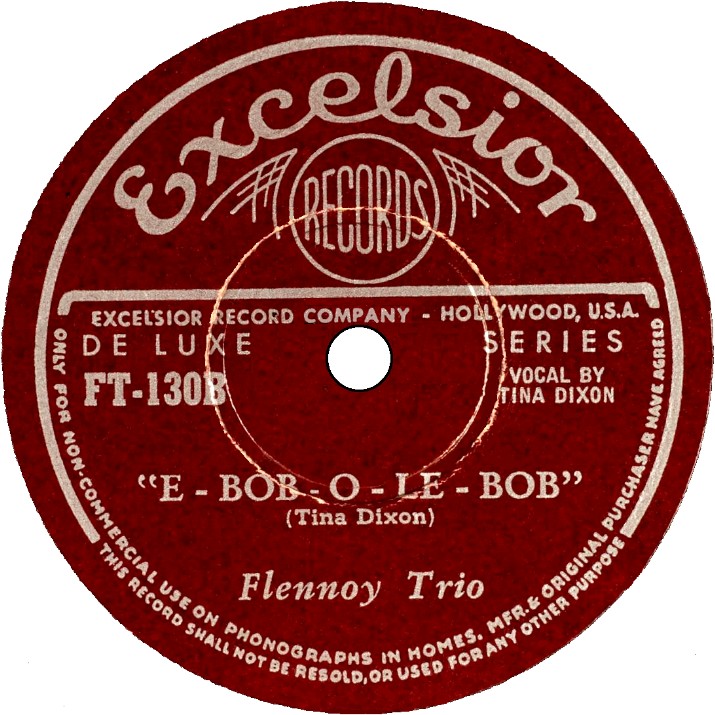
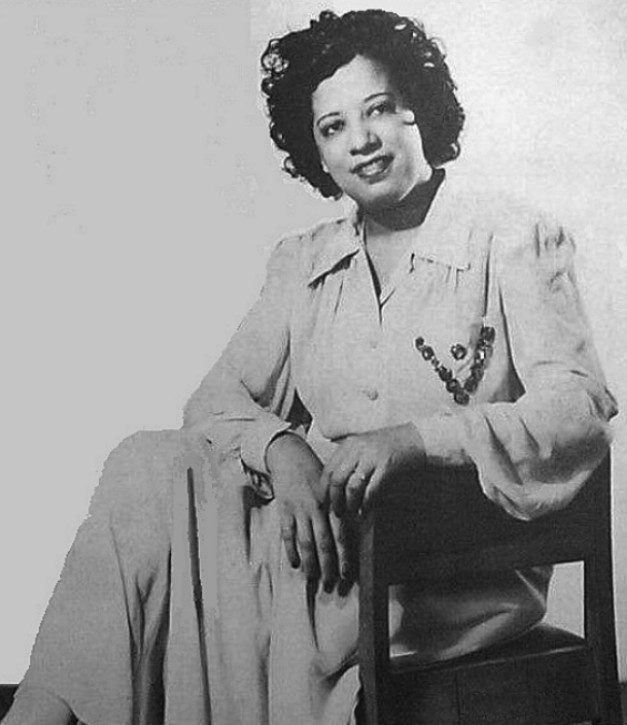
|
Above: Photo of Tina Dixon.
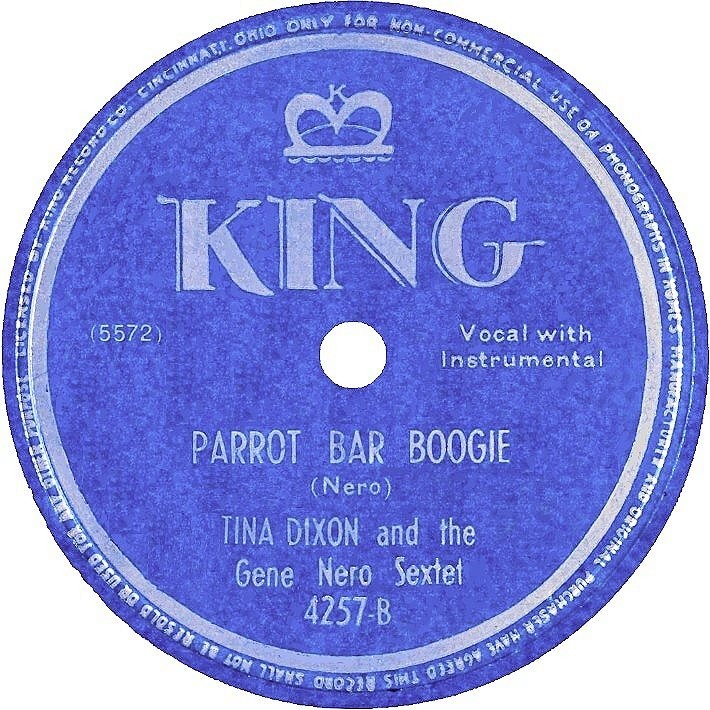
|
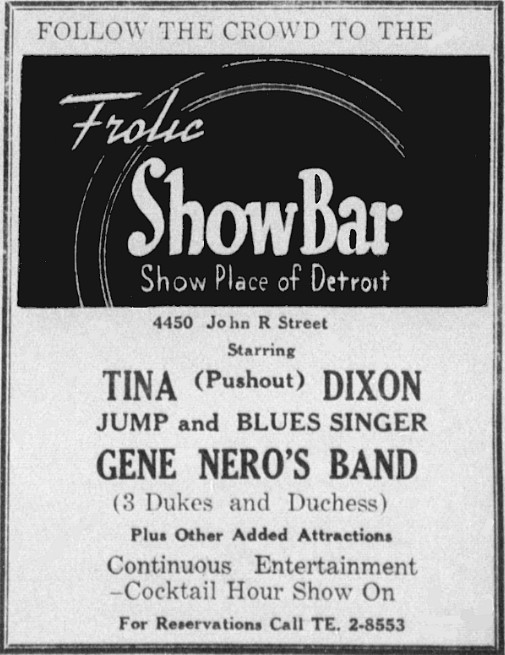
|
Above Left: Label image of King 4257-B, recorded in 1947 and released in 1948. Gene Nero composed this side and Tina Augustine Dixon has that honor on the flip-side, "Walk That Walk Daddy-O", as confirmed at BMI.com. Gene Nero, alto saxophonist, was the band leader at Detroit's Parrot Bar in 1947. His Four Dukes Of Rhythm at this time were George Washington (bass), Bob Ackertson (drums), Prince Albert (piano), and Arthur E. Ulrich (guitar).
There was a second record on King released in late 1949, but recorded in 1947. That one features Tina Dixon on one side and Gene Nero on the other.
Above Right: DETROIT TRIBUNE, January 4, 1947. (This clipping was provided by Dan Kochakian.)
NOTE: Tina (Pushout) Dixon.... "Pushout" is not quite as explosive as her other description, "Bombshell Of The Blues".At Direct Right: DETROIT TRIBUNE, April 16, 1948: (GENE NERO)
HEAD MAN of the Tropical Show Bar's Four Dukes Of Rhythm is Gene Nero, featured nightly....(NOTE: Nero was from Detroit. In the 1950s, "Music Under Direction of Gene Nero" provided backing for some of the artists on Detroit's Fortune label.)
The Billboard Review (1/22/49):
TINA DIXON & THE GENE NERO SEXTET — KING 4257
Parrot Bar Boogie (71) Small combo generates some steam in a frantic boogie-woogie performance, with vocal little more than a reiterated tag.
Walk That Walk Daddy-O (75) Thrush gets off some lusty shouting to a fast rocking blues.(NOTE: Ratings had a range of 0-100 with 70-79 considered as "good".)
LISTEN (Windows Media Player):
1. "Parrot Bar Boogie" - Tina Dixon And The Gene Nero Sextet - King 4257-B - 1948.
2. "Walk That Walk Daddy-O" - Tina Dixon And The Gene Nero Sextet - King 4257-A - 1948.BOTH SONGS played in sequence.
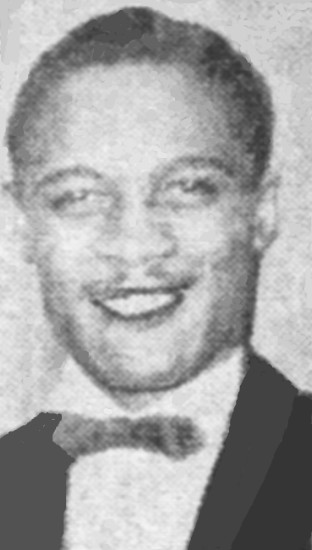
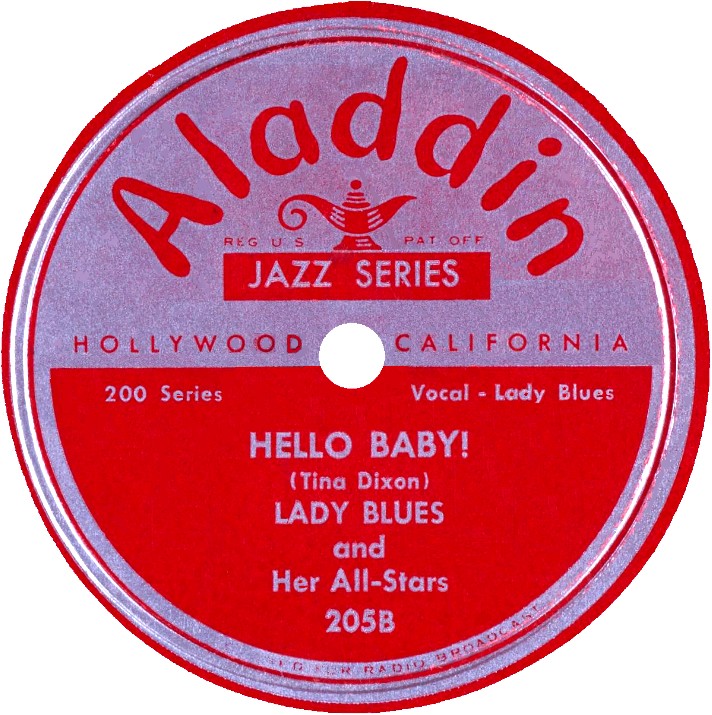
|
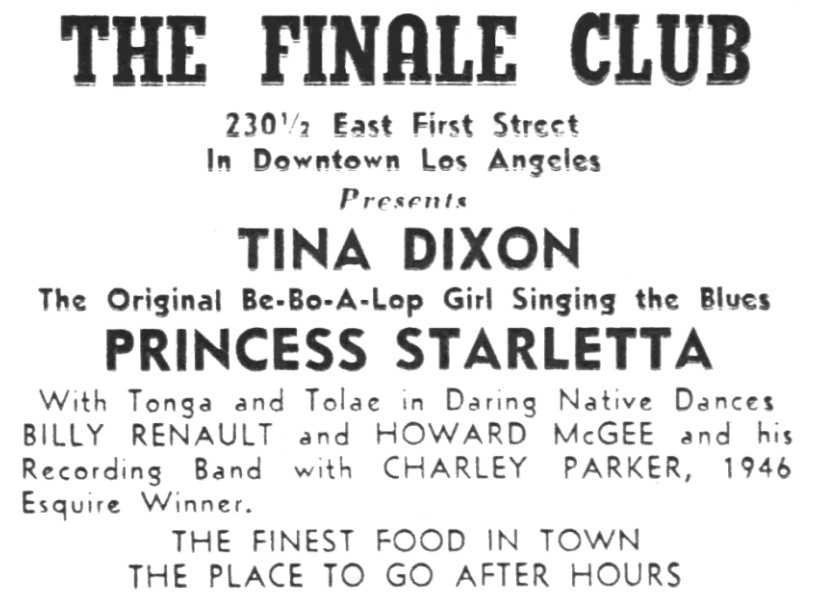
|
Above Left: Label image of Aladdin 205B, released in 1947. "Lady Blues" is none other than our blues lady, Tina Dixon. Tina is credited as composer on the labels for both sides of the record. However, no credits are shown at BMI.com for either song.
Above Right: CALIFORNIA EAGLE, July 25, 1946.
LISTEN (Windows Media Player):
1. "Hello Baby!" - Lady Blues (Tina Dixon) And Her All-Stars - Aladdin 205B - 1947.
2. "Don't You Know I Want To Love You?" - Lady Blues (Tina Dixon) And Her All-Stars - Aladdin 205A - 1947.BOTH SONGS played in sequence.
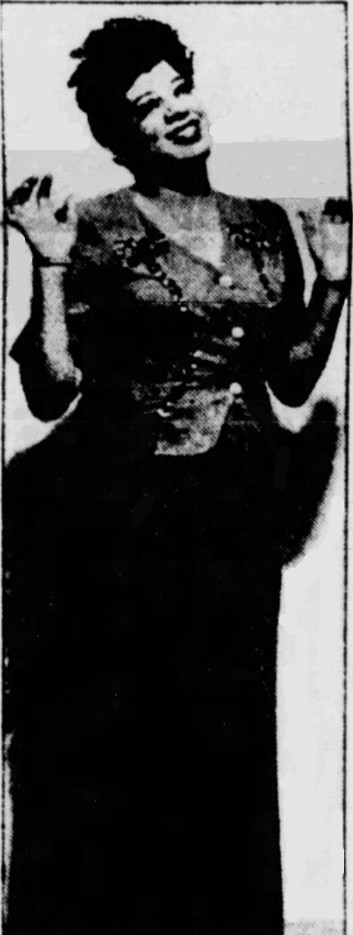
|
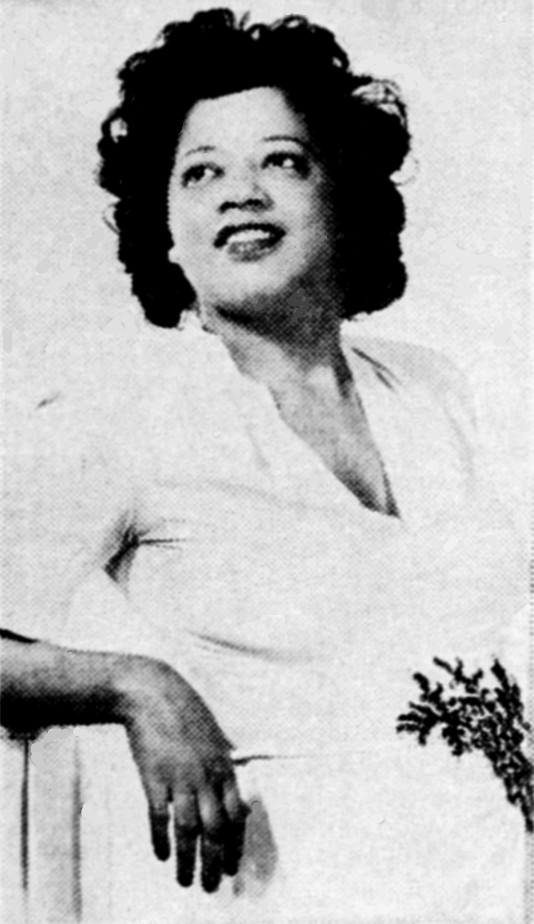
|
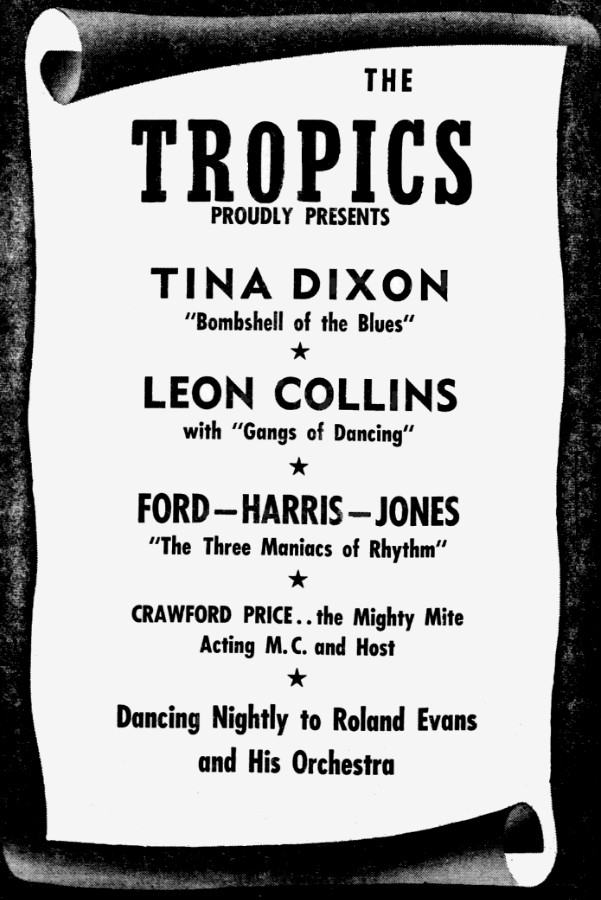
|
Above Left: MICHIGAN CHRONICLE (Detroit, Michigan), September 25, 1943. Above Middle: DEMOCRAT AND CHRONICLE (Rochester, New York), February 16, 1945.
Above Right: RENO GAZETTEE JOURNAL, June 15, 1946.
IVORY JOE HUNTER Ivory Joe Hunter, from Texas, was a singer, piano player, band leader, composer, and arranger.
Ivory Joe made records for the Exclusive (1945), Pacific (1945-1947), 4-Star (1947), King (1947-1949), M-G-M (1949-1954), Dot (1951), and Atlantic (1954-1958) labels.
Ivory Joe was a prolific songwriter. BMI.com credits him with 346 titles, including seven "Award Winning Songs". His songs were recorded by many artists other than himself. This includes, among others, Jesse Belvin, The Five Keys, B.B. King, Ruth Brown, and at least four by Elvis Presley.
THE BILLBOARD, January 13, 1958: IVORY JOE HUNTER
Ivory Joe Hunter has had a dual career in music—as songwriter and vocalist—and been successful in both.Born in Kirbyville, Tex., he played piano and sang from his earliest years. In his teens he was active in a church choir and sang with several spiritual quartets. On graduation from high school, Ivory Joe formed his own band, which was active for some time in Port Arthur and Houston.
At 20, he formed a band in Beaumont, Tex., and soon afterward moved to Houston where he located from 1936 to 1942. At that time, he decided to go to California, and gained immediate popularity in the San Francisco-0akland area.
In 1945, Ivory Joe made his first record. It was on his own label, Ivory Records. Later he was affiliated with the Pacific and King labels.
M-G-M Records acquired Ivory Joe in 1949 when his popularity had reached a high point due to his transcontinental one-nighter treks with his band. Several of his M-G-M disks were big hits.
Atlantic Records signed Ivory Joe in 1954 and hit paydirt from his first record which was "It May Sound Silly". "A Tear Fell" and "Since I Met You, Baby" were subsequent smashes. For the latter record, he was awarded a gold disk on the Ed Sullivan TV show.
SAN ANGELO STANDARD TIMES, April 22, 1951:
IVORY JOE HUNTER BEST JAZZ ARTIST
NEW YORK—The Juke Box Operators of America, in their Fifth Annual Poll of the automatic music industry, have voted M-G-M Records star, Ivory Joe Hunter, "the Best Jazz 'N Blues Artist of 1950".At the same time, it was also announced that Hunter's recording of "I Almost Lost My Mind" garnered honors as "the Best Jazz 'N Blues Record of 1950".
Also placing high in the voting was another M-G-M platter by the same artist: his recording of "I Need You So", which still occupies a high spot on best-seller lists.
LISTEN (Windows Media Player):
"I Almost Lost My Mind" - Ivory Joe Hunter - M-G-M 10578-A - 1949.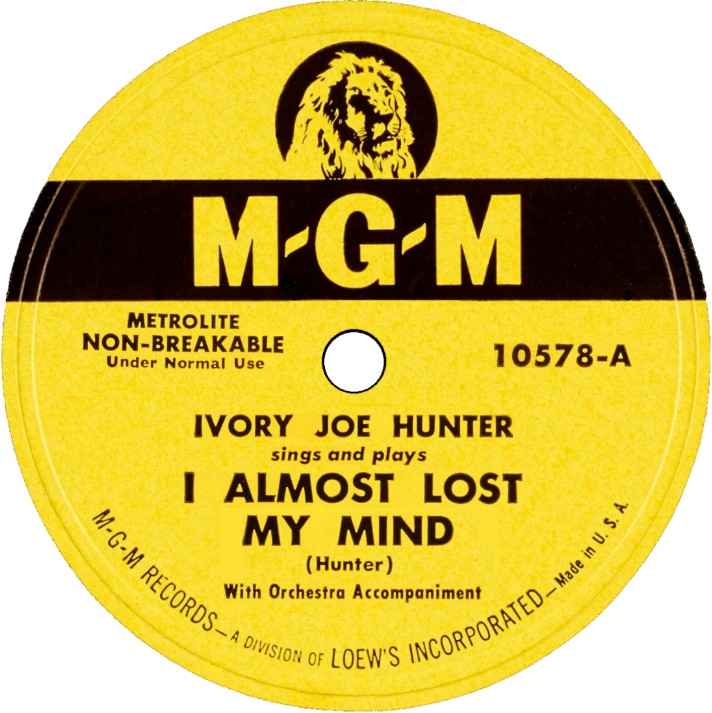
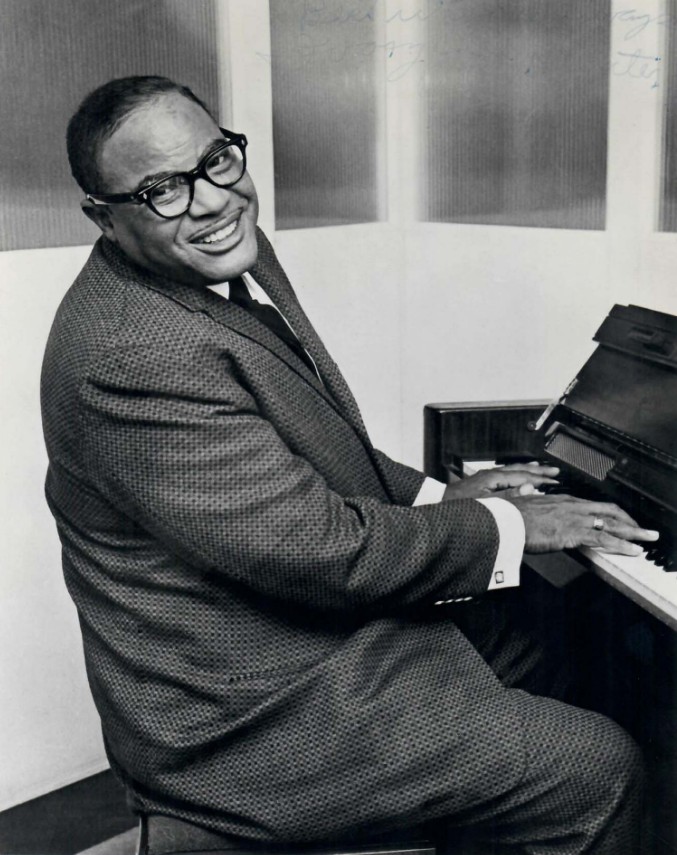
|
Above: Photo of Ivory Joe Hunter. There is an unreadable inscription at the top, in very faded ink.
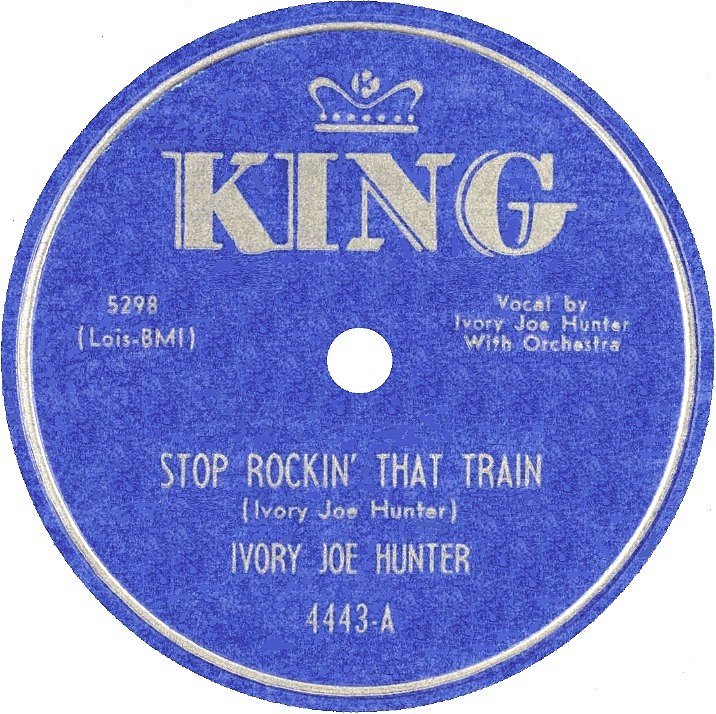
|
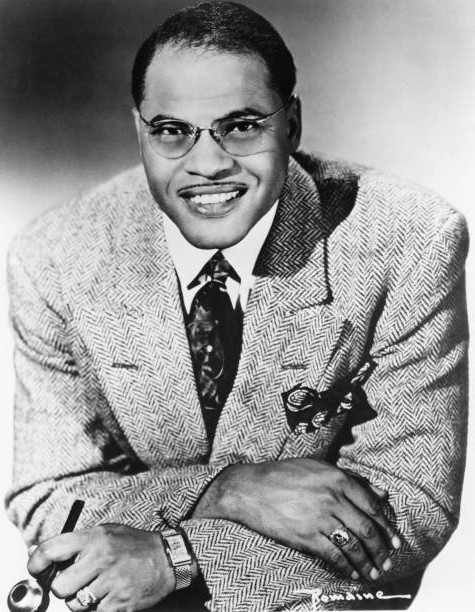
|
Above Left: Label image of King 4443-A, released in 1947. The actual words that Ivory Joe sings are "Stop That Rockin' Train". Both sides were composed by "Ivory Joe Hunter". Above Right: Another photo of Ivory Joe Hunter.
NOTE: That's a small pipe for a big six foot three guy.LISTEN (Windows Media Player):
1. "Stop Rockin' That Train" - Ivory Joe Hunter - King 4443-A - 1947.
2. "She's Gone Blues" - Ivory Joe Hunter - King 4443-AA - 1947.BOTH SONGS played in sequence.
Above Left: SACRAMENTO BEE, November 9, 1946.
NOTE: Nitz Jackson was one of the owners of The Zanzibar. Some newspapers, in about the same general time period, state that Ivory Joe was discovered in a Texas honky-tonk by Louis Jordan. This seems to be corroborated by Jordan himself.Above Middle: Ivory Joe Hunter.
Above Right: BIRMINGHAM NEWS, January 15, 1950.
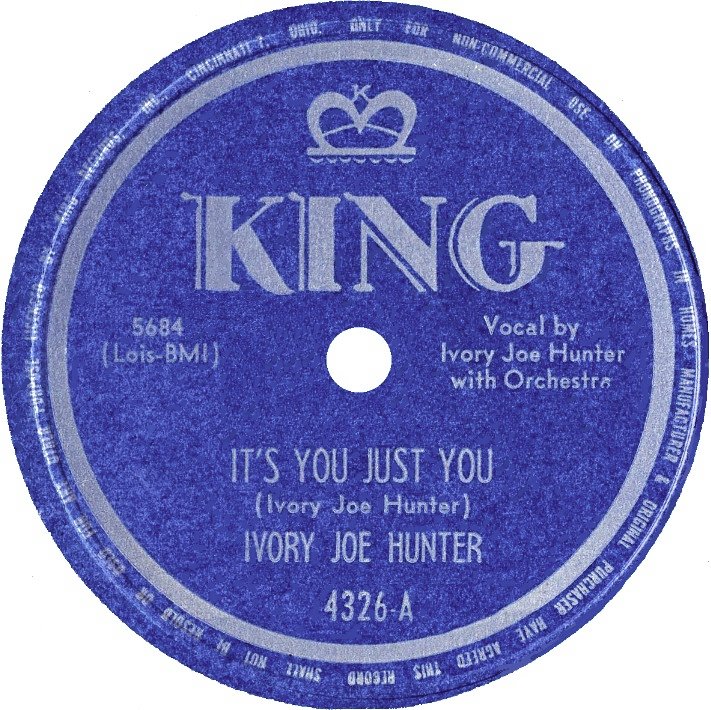
|
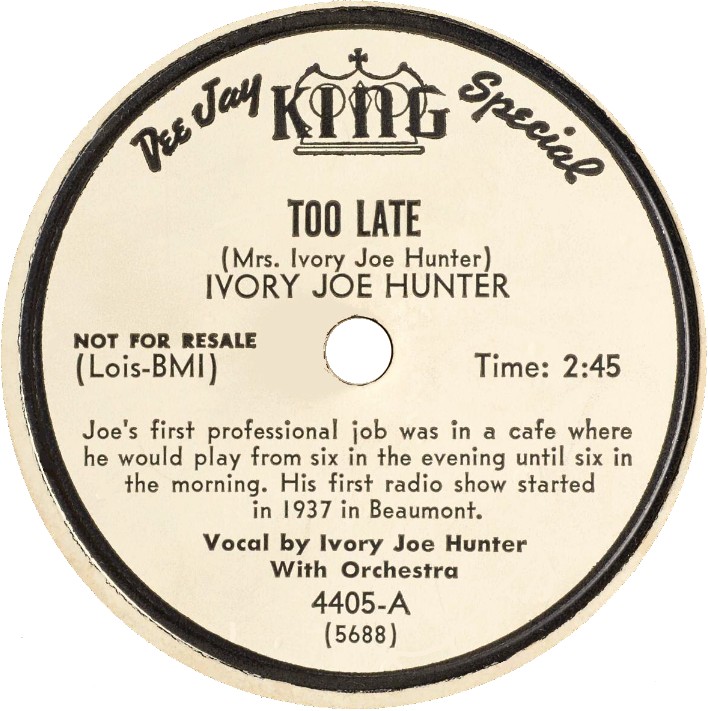
|
Above Left: Label image of King 4326-A, released in 1949. The flip-side, "I Quit My Pretty Mama", is an "answer" song to Ivory Joe's big 1948 hit, "Pretty Mamma Blues", released on the 4-Star label.
Above Right: Label image of King 4405-A, released in 1949.
It's unclear who actually composed "Too Late". Ivory Joe's wife, Beatrice Hunter, was an accomplished songwriter, with a BMI Award Winning Song, "Guess Who", released by Ivory Joe on King in 1949. That label also credits "Mrs. Ivory Joe Hunter". However, BMI.com gives "Ivory Joe Hunter" composer credit for "Too Late".
BIO FROM THE LABELS: "Ivory Joe Hunter was born in Kirbyville, Texas, October 11, 1911. He attended school in Beaumont. He was born with music in his soul. His entire family are musicians and his two brothers have bands. Joe's first professional job was in a cafe where he would play [the piano] from six in the evening until six in the morning. His first radio show started in 1937 in Beaumont."
The Billboard Review (12/24/49):
IVORY JOE HUNTER — KING 4326
It's You Just You (67) Hunter's convincing style tries hard to sell one of his less convincing compositions.
I Quit My Pretty Mama (84) Hunter does a solid selling job both on the vocals And on the keyboard with this feelingful slow blues.(NOTES:
1. Ratings had a range of 0-100 with 60-69 considered as "satisfactory" and 80-89 considered as "excellent".
2. It's unusual to have such a large difference in rating between two sides. Judge for yourself.)Cash Box Review (12/24/49):
IVORY JOE HUNTER — KING 4326....It's You Just You/I Quit My Pretty Mama
Pair of sides by Ivory Joe Hunter, and the set-up of "Itís You Just You" and "I Quit My Pretty Mama" headed music ops way, with the refrain of this biscuit spelling coin play all the way.Music ops need no urging when it comes to an Ivory Joe Hunter platter—especially so when it has the stuff this one has. Both ends show Joeís fine style in high light, and should sit well with his many fans. Disk is the sort that consistently draws loads of juke box play. Ops should get it.
Cash Box Review (10/14/50):
IVORY JOE HUNTER — KING 4405....Too Late/Lying Woman
The widely popular Ivory Joe Hunter has some fresh wax in store for music ops in this hot pair. Both ends of the platter are potential winners that should do extremely well in the phonos. Music is in the blues vein and features Ivory Joe in excellent voice. Ops should, by all means, lend an ear to this platter.LISTEN (Windows Media Player):
1. "It's You Just You" - Ivory Joe Hunter - King 4326-A - 1949.
2. "I Quit My Pretty Mama" - Ivory Joe Hunter - King 4326-AA - 1949.
3. "Too Late" - Ivory Joe Hunter - King 4405-A - 1949.
4. "Lying Woman" - Ivory Joe Hunter - King 4405-AA - 1949.ALL FOUR SONGS played in sequence.
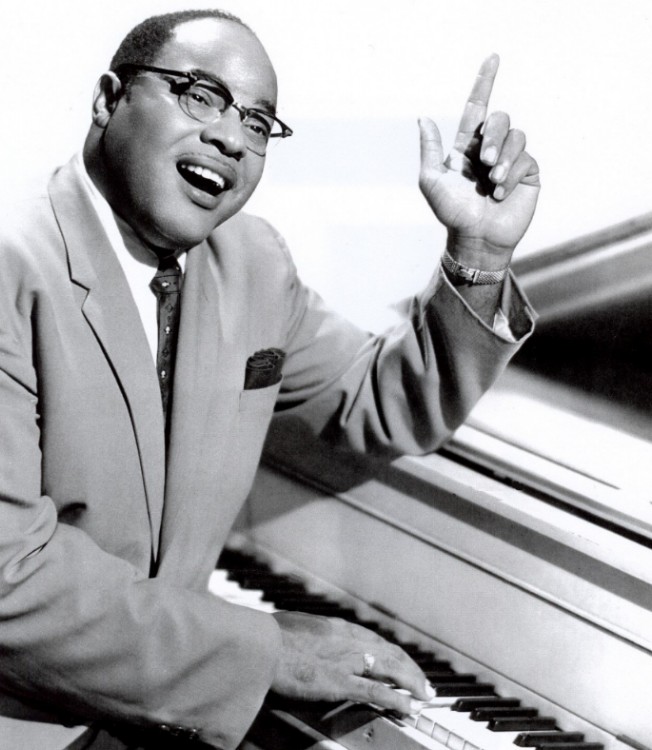
IVORY JOE HUNTER
EXTRA RECORD — PRETTY MAMMA BLUES
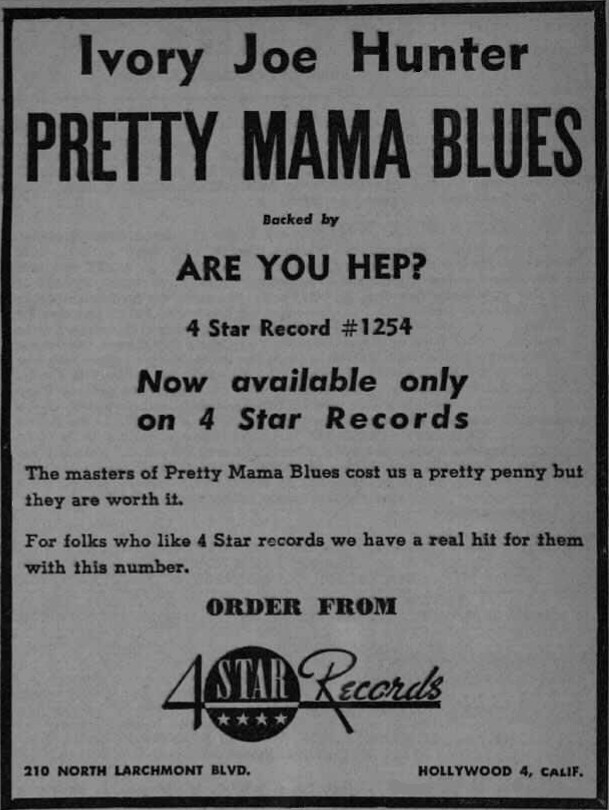
|
Above: CASH BOX, July 10, 1948.
NOTE: The masters for both sides were purchased from Pacific Records by 4-Star Records. Ivory Joe was recording for Pacific in 1945-1947. Don't know how much the "pretty penny" was, but 4-Star got a number one r&b record out of it! Both sides were composed by Ivory Joe Hunter.
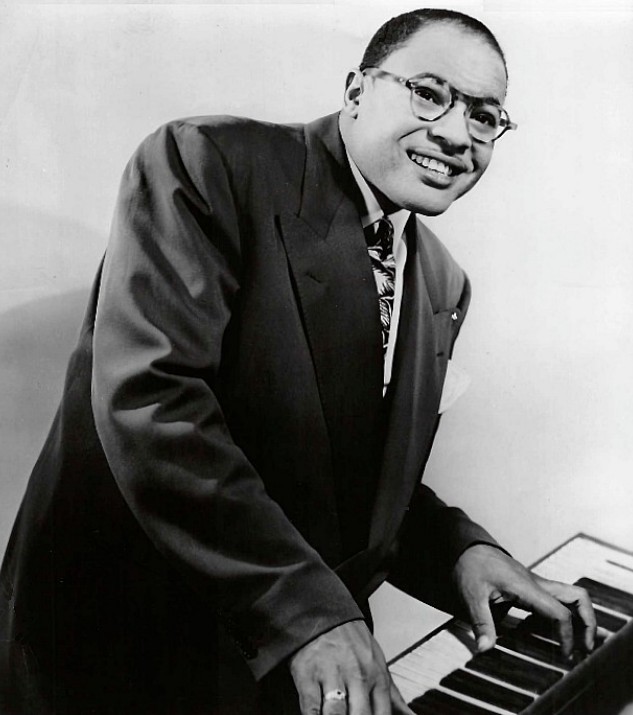
Above Left: Label image of 4-Star 1254, released in July 1948. Interesting that in most places the song is mentioned, including BMI.com, the spelling is "Pretty Mama Blues" (not "Mamma"). The flip-side, "Are You Hep", was originally released as "Are You Hep?" on Pacific 623 in September 1946. The Pacific matrix number "MS 130" is stamped in the 4-Star record's dead wax.
There were eight more of Ivory Joe Hunter's Pacific masters released on the 4-Star label (1948-1951). "Aurelia" re-appears on one side of the second Ivory Joe record on 4-Star ("I Love My Man").
4-Star Records was another of those labels, similar to King and Gilt-Edge, that was heavy in both rhythm & blues and country & western music.
Above Middle: THE BILLBOARD, August 7, 1948.
Above Right: Label image of Pacific 623, released in September 1946. The female blues vocalist is Aurelia Joyner, who was from New York City. The flip-side of Pacific 623 is "I Love My Man", another vocal by Aurelia.
Cash Box Review (8/7/48):
IVORY JOE HUNTER — 4-Star 1254....Pretty Mama Blues/Are You Hep
Oh, whatta dilly this thing is! Itís a must on your machine, and a cinch to score heavily in every race location around town. Widely publicized Ivory Joe Hunter steps out and really gives with this bit titled "Pretty Mama Blues".With the metro of the song spilling in slow fashion. Hunter pitches smooth and full fashioned pipes in brilliant style to set the stage for some phenomenal coin play. Thereís no doubt about it—itíll slay phono fans everywhere.
On the flip with "Are You Hep? ", gal chirp Aurelia spills the effective vocal effort here in pleasing fashion. All the wax is on the topside, with Ivory Joe sure to ride hot and heavy with this one.
The Billboard Review (8/7/48):
IVORY JOE HUNTER (Aurelia) — 4-Star 1254
Are You Hep (64) Aurelia thrush does her best with mediocre hipster jingle.
Pretty Mamma Blues (83) Melodic, low-grooved blues gets an indigo mood chirping from Joe and easy-ride band backing. Side already smoking up a breeze on the jukes.(NOTE: Ratings had a range of 0-100 with 60-69 considered as "satisfactory" and 80-89 as "excellent".)
Above: 1951 photo of Ivory Joe Hunter. CASH BOX, August 28, 1948:
....(Ivory Joe) Hunter, whose "Pretty Mama Blues" disking for Four Star is currently riding the best-seller lists, normally worked the Northern California spots and was particularly favored in the Oakland area. He formerly recorded for Pacific Records, a Coast indie, and was found more recently in the King Records fold.His "Pretty Mama Blues" was originally cut for Pacific label, but was among a batch of masters bought by Four Star's prexy, Bill McCall....
CASH BOX, August 7, 1948:
....Bill McCall, prexy of 4 Star Records, riding high with his Ivory Joe Hunter version of "Pretty Mama Blues" soaring to the top....CASH BOX, September 4, 1948:
....Bill McCall of 4 Star Records singing the praises of Ivory Joe Hunter, with the latterís "Pretty Mama Blues" now hitting across the boards....CASH BOX, November 20, 1948:
....New Ivory Joe Hunter release being carefully selected by Bill McCall, prexy of 4-Star Records, from the thirty-two masters he recently acquired from Pacific Records. ....Bill wants to make sure it lives up to "Pretty Mama Blues"—or better....At Direct Right: THE BILLBOARD, August 21, 1948.
NOTE: "Pretty Mama Blues" went to #1 on Billboard's "Best Selling Retail Race Records" chart in the September 18, 1948 issue.LISTEN (Windows Media Player):
1. "Pretty Mamma Blues" - Ivory Joe Hunter And His Band (Vocal By Ivory Joe Hunter) - 4-Star 1254 - 1948.
2. "Are You Hep" - Ivory Joe Hunter And His Band (Vocal By Aurelia And The Band) - 4-Star 1254 - 1948.BOTH SONGS played in sequence.
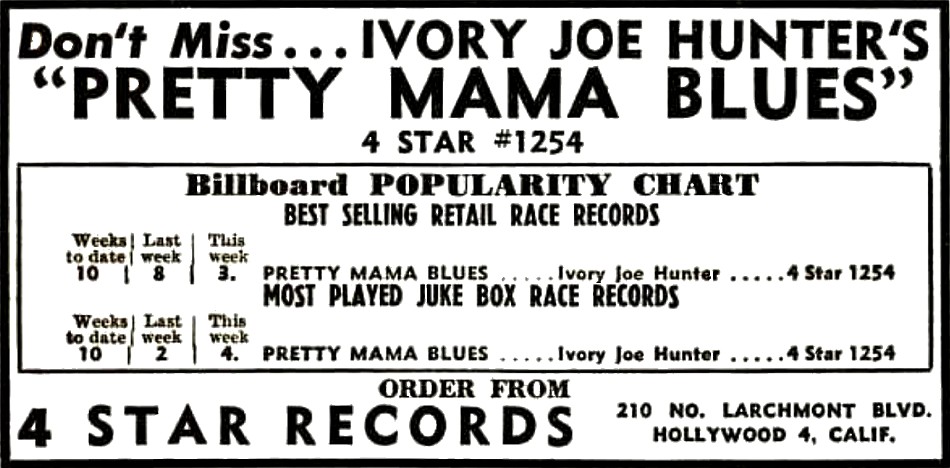
EXTRA RECORD — A TEAR FELL
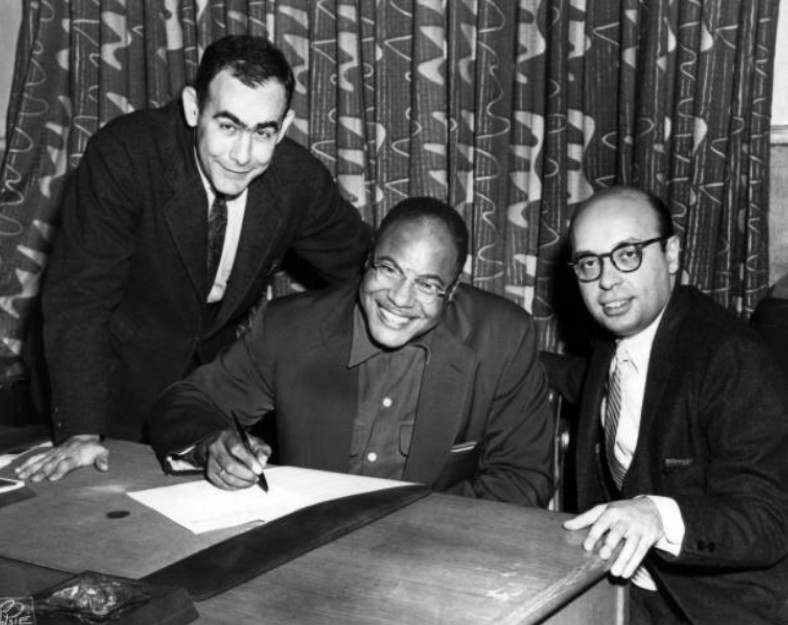
|
Above: Photo of Ivory Joe Hunter signing a contract with Atlantic Records.
Atlantic executives, (L) Jerry Wexler and (R) Ahmet Ertegun, look on.
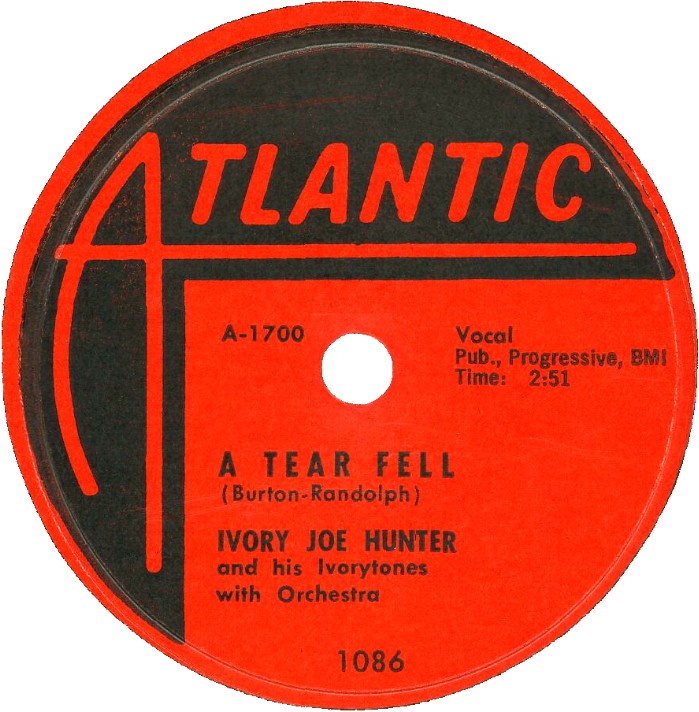
|
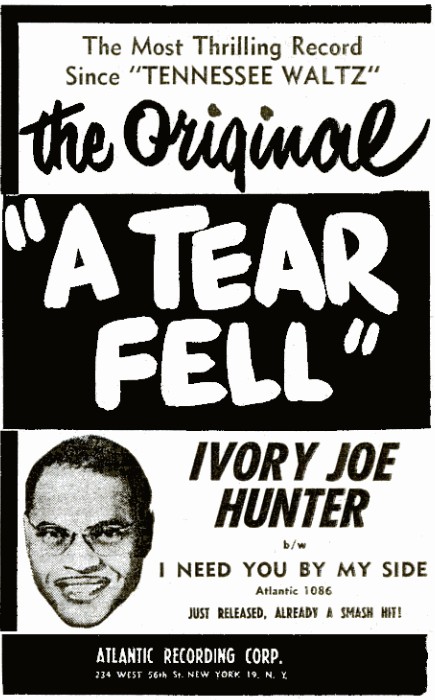
|
Above Left: Label image of Atlantic 1086, recorded in November 1955 and released in January 1956. Composers of this BMI Award Winning Song are Dorian Burton and Eugene Randolph. Burton co-composed another two BMI Award Winning Songs, including "Still" by LaVern Baker on Atlantic.
The flip-side, "I Need You By My Side", per BMI.com, was composed by "Joe Hunter", the label crediting "Hunter".
"A Tear Fell" was the third of three records by Ivory Joe Hunter And His Ivorytones, all on the Atlantic label (1955-56). The Ivorytones were a formation of Atlantic's ubiquitous "house" vocal group, generally known as The Cues.
Ivory Joe continued making hits for Atlantic as a single artist, but sometimes with vocal group backing.
Above Right: THE BILLBOARD, February 11, 1956.
At Direct Right: Ivory Joe Hunter, with unknown, checking out an Atlantic 45-rpm record. Come on, guys, you shouldn't handle a record with your fingers on the grooves.
THE BILLBOARD, December 18, 1954: JOE HUNTER SIGNS ATLANTIC PACT...
Atlantic Records has signed Ivory Joe Hunter, for the past three years with the M-G-M label. Hunter a few years ago was one of the hottest warblers in the r.&b. field.His "I Nearly Lost My Mind" [sic] and "I Need You So" were big hits for M-G-M.
The Billboard Review Spotlight on... (2/11/56):
IVORY JOE HUNTER — ATLANTIC 1086
A TEAR FELL: Ivory Joe will undoubtedly do well with this simply styled weeper. The melody has extra appeal with its roots in the old and familiar "Clementine". Singer has a telling delivery that should bring action in both r.&b. and pop fields as well.Flip is "I Need You By My Side", a persuasive and pleading ballad.
(NOTE: This must be a different "Clementine" than the song "Oh My Darling Clementine" or it makes no sense. Can anyone explain it?)
LISTEN (Windows Media Player):
1. "A Tear Fell" - Ivory Joe Hunter And His Ivorytones - Atlantic 1086 - 1956.
2. "I Need You By My Side" - Ivory Joe Hunter And His Ivorytones - Atlantic 1086 - 1956.BOTH SONGS played in sequence.
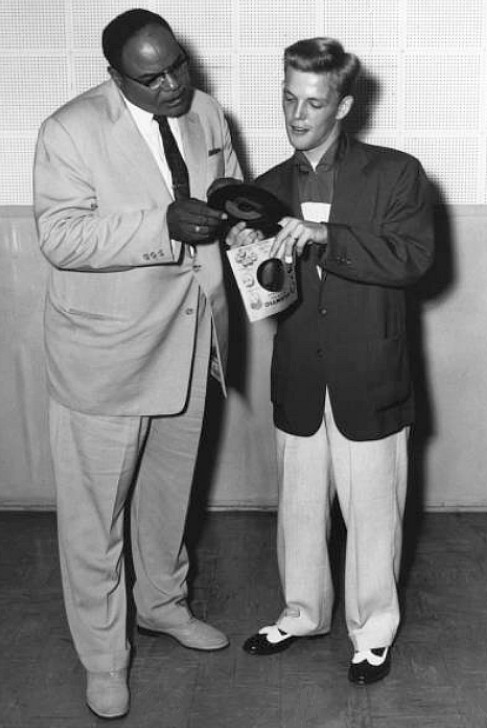
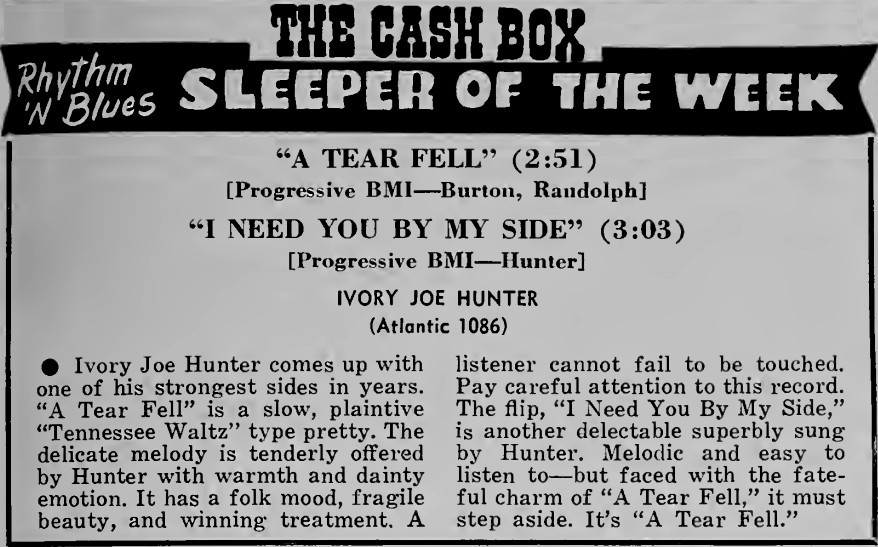
|
1. "Tomorrow Night" - Lonnie Johnson - King 4201-A - 1948.
ALL TWENTY-EIGHT ABOVE KING LABEL SONGS played in sequence.
|
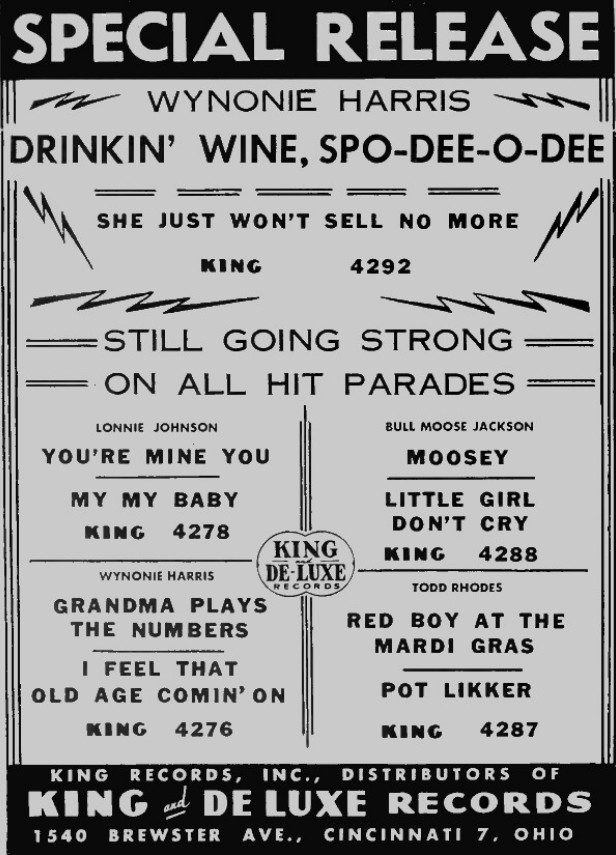
(NOTE: Todd Rhodes will be included in Part Three of this article.) |
Last Update: April 9, 2024
E-mail Me: